2023 ThyCa Research Grants

Chandrayee Ghosh, PhD – Stanford University, Stanford, CA
Combination auranofin and BRAF inhibition treatment in BRAFV 600E mutant anaplastic thyroid cancer.
Dr. Chandrayee Ghosh has a broad background in the field of Cancer and Immunology, with specific training and expertise in cancer therapeutics and translational science pertaining to natural compounds and drug repurposing. She has been working in this field for over ten years. Her current research includes identifying novel uses and mechanism of action of FDA approved compounds and their combinations in targeting endocrine cancers. In the past, she worked in pancreatic ductal adenocarcinoma (PDAC) and identified the interaction of KDM3A with DCLK-1 and their role in PDAC tumorigenesis and stemness. In this work she established that N-oxalylglycine, a α-ketoglutarate mimetic, affects KDM3A activity. She also identified the cluster of master transcription factors or super-enhancers as novel targets for PDAC using a combination of natural compounds as anticancer agents. Her doctoral thesis was on the identification and characterization of toll-like receptors (TLR-2, 4, 6) in thymic, splenic and lymph node lymphocytes and macrophages of Swiss albino mice and their role in S. aureus infection and lipopolysaccharide. She has successfully published her research findings in high impact peer-reviewed journals. Her work has received media coverage both nationally and internationally and she has presented her research at international conferences where she has received awards. The goal of the present proposal is to determine if targeting BRAF V600E mutant anaplastic thyroid cancer with auranofin and BRAF inhibition has synergistic/additive activity and induces an antitumor immune response. She has conducted the experiments and analyzed the preliminary data in the current proposal which shows a strong premise for evaluating auranofin and BRAF inhibition combination treatment in BRAF V600E mutant anaplastic thyroid cancer. Her previous experience has prepared her well to conduct the preclinical studies proposed in this grant.
Chandrayee Ghosh ThyCa Research Award Acceptance Video
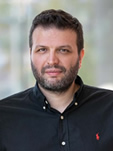
George S. Karagiannis, DVM, PhD – Albert Einstein College of Medicine, New York, New York
Exploiting the Midkine-driven Embryonic Reprogramming in Anaplastic Thyroid Carcinoma.
George S. Karagiannis, DVM, PhD, is currently an assistant professor in the Department of Microbiology and Immunology (Albert Einstein College of Medicine), and also holds a Degree in Veterinary Medicine (DVM) from the Aristotle University of Thessaloniki in Greece. His professional expertise stems in the development of preclinical mouse models of solid carcinomas and metastasis, digital (immuno)pathology and advanced microscopy, including multiphoton intravital imaging and high-throughput immunofluorescence microscopy. His laboratory investigates the critical role of the tumor microenvironment in eliciting a prometastatic and immunosuppressive milieu that obfuscates currently used therapeutic modalities, such as chemotherapy and immunotherapy. He has published >50 peer-reviewed research and review articles in high-profile journals, such as Science Translational Medicine, Cancer Research, Nature Methods, NPJ Breast Cancer, and Nature Cancer, among others. His research program aspires to propose novel interventions that would exploit therapeutic vulnerabilities in the tumor microenvironment to improve cancer patient outcomes. He greatly values academic teaching and student-centered organized classroom, and has been teaching histology in first-year medical students at Einstein for the past six years. Outside science, he enjoys archery and attends lessons of modern bridge.
George S. Karagiannis ThyCa Research Award Acceptance Video
2022 ThyCa Research Grants
 Iñigo Landa, PhD – Instructor in Medicine, Brigham and Women’s Hospital, Boston, MA, United States
Iñigo Landa, PhD – Instructor in Medicine, Brigham and Women’s Hospital, Boston, MA, United States
Basic – Thyroid Cancer
Therapeutic vulnerabilities of telomerase-reactivated thyroid cancers
Dr. Landa’s research focuses on identifying key genomic events and their underlying mechanisms in thyroid cancer progression, using cell systems, animal models and patients’ samples.
Iñigo Landa, PhD, is a thyroid cancer scientist and an ATA member since 2020. Dr. Landa holds an Associate Scientist position at the Division of Endocrinology, Diabetes and Hypertension at Brigham and Women’s Hospital (BWH), and he is an Instructor in Medicine at Harvard Medical School (HMS) in Boston, MA. He completed his postdoctoral training in Dr. James Fagin lab at Memorial Sloan Kettering Cancer Center (MSKCC) in New York, NY, and his graduate studies in Dr. Mercedes Robledo’s group at the Spanish National Cancer Research Centre (CNIO) in Madrid, Spain. Before that, he got a double BS in Biology and Biochemistry from the Universidad de Navarra (Pamplona, Spain). The main focus of Dr. Landa’s lab is to identify key genetic events and to understand their underlying mechanisms in thyroid cancer progression. He is particularly interested in genomic alterations affecting gene expression. To this end, his lab employs a variety of techniques in pre-clinical cancer cell systems, genetically engineered mice and patients’ samples.
Iñigo Landa ThyCa Research Award Acceptance Video
 Julio Ricarte Filho, PhD – Research Fellow, Children’s Hospital of Philadelphia, Philadelphia, Pennsylvania, United States
Julio Ricarte Filho, PhD – Research Fellow, Children’s Hospital of Philadelphia, Philadelphia, Pennsylvania, United States
Basic – Medullary Thyroid Cancer
Integrative Genomic and Transcriptomic Analysis of MEN2B-associated MTC
Dr. Ricarte Filho’s research focuses on the discovery of genomic alterations in thyroid cancer and evaluation of their clinical significance as diagnostic, prognostic and predictive markers with long term goal of improving patient management.
Julio’s career as a translational cancer scientist has been dedicated to the discovery of genomic alterations in thyroid cancer and evaluation of their clinical significance as diagnostic, prognostic and predictive markers with long term goal of improving patient management. During his PhD and postdoctoral fellowship at James Fagin’s laboratory at Memorial Sloan-Kettering Cancer Center (NY) he was actively involved in pioneering discoveries such as the identification of ETV6-NTRK3 fusion oncogenes in thyroid cancer from children exposed to radiation after the Chernobyl accident as well as activating mutations of AKT1 in advanced metastatic thyroid cancer refractory to RAI. After several years studying thyroid cancer, he transitioned to work for 2 years on methylation markers with diagnostic and prognostic potential in lung cancer liquid biopsies at University of Illinois. In 2020, Dr Aime Franco recruited Julio to her lab based at Children’s Hospital of Philadelphia (CHOP). At CHOP, Julio is committed to translational research projects with the potential to impact the treatment of children with thyroid cancer. His current research is focused on the identification and characterization of somatic alterations underlying pediatric thyroid cancer initiation and progression.
Julio Ricarte Filho ThyCa Research Award Acceptance Video
 Theodora Pappa, MD, PhD – clinical/research postdoctoral fellow, Brigham and Women’s Hospital, Boston, MA. United States
Theodora Pappa, MD, PhD – clinical/research postdoctoral fellow, Brigham and Women’s Hospital, Boston, MA. United States
Basic – Thyroid Cancer
Dissecting the immune programs driving thyroid cancer progression
Dr. Pappa’s research focuses on dissecting and clinically interpreting the cellular programs implicated in thyroid cancer.
Dr Pappa is a physician scientist committed to precision medicine in thyroid cancer genomics and aspires to become a leader in computational onco-endocrinology. Her main research focus is to chart the tumor ecosystem in thyroid malignancies and leverage the advances of next generation sequencing and novel computational approaches in order to dissect and clinically interpret thyroid cancer genome. She has conducted multifaceted patient-oriented research in Europe and the US. Her prior experience spans from the clinical spectrum, assessing the impact of endocrine system in cerebrovascular disease and the implications of aldosterone secretion in the pathophysiology of hypertension, to translational science to characterize the genetic defects underlying inherited thyroid disease. Throughout these years, she realized the power of data science to mine big genomic data and answer biologically important questions. With this award, her goal is to dissect the immune programs driving thyroid cancer progression. This project proposed here represents questions with important biological and clinical implications, where she has the skills, tools, experience, data, and guidance to make important discoveries.
Theodora Pappa ThyCa Research Award Acceptance Video
2021 ThyCa Research Grants
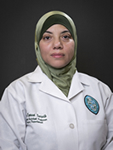 Eman Toraih, MD, PhD, MS – Associate Professor, New Orleans, Louisiana, United States
Eman Toraih, MD, PhD, MS – Associate Professor, New Orleans, Louisiana, United States
Thyroid Cancer
miR-145/MMP9 ratio for prediction of recurrence in thyroid cancer
Dr. Toraih research focuses on developing and validating highly-sensitive blood tests that rely on nanotechnology-based strategies to find previously undetectable biomarkers of thyroid cancer that has the potential to improve countless lives and transform medicine.
Eman Toraih, MD, PhD, is an Assistant Professor of Medical Genetics, Department of Surgery, Tulane University, School of Medicine. Dr. Toraih received her undergraduate (2002) and Medical genetics master (2008) and doctorate (2014) degrees from Suez Canal University. She was teaching Molecular Genetics and Cancer Genomics to medical students. She worked as a head of Molecular lab in the Center of Excellence of Molecular and Cellular Medicine, founded in 2015. Her research focused on translational cancer biology and has presented her work in various local and international conferences where she received numerous awards. She conducted sizable projects on cancer, two of which focused on the genetic landscape of brain and breast cancer patients. Her current research work focuses on the identification of novel markers for thyroid cancer. In her lab, they are performing a range of in vivo, in vitro, and human studies to investigate the trafficking partners of nuclear mutant BRAF and causal regulatory network leading to treatment resistance. Toraih recently developed a predictive signature and nomogram for accurate selection of active surveillance in thyroid cancer patients. She has published over 110 articles and three books and have served on numerous editorial boards of peer-reviewed journals.
Eman Toraih ThyCa Research Award Acceptance Video
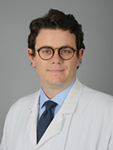
Julien Hadoux, MD, PhD – Villejuif, Val de Marne, France
Thyroid Cancer
PRIMAThyCCIO: PRofiling IMmune cells in Anaplastic Thyroid CarCInOma
Dr. Hadoux’s research focuses on the immune landscape of anaplastic thyroid carcinoma to explore for new biomarkers of prognostic and therapeutic interest.
Julien Hadoux is a medical oncologist and attending physician, specialized in endocrine oncology, at Gustave Roussy cancer center, Villejuif, France. Following medical degree, he has trained in an oncology PhD program, focusing on modelling multiple endocrine neoplasia type 2 with RET-mutated induced pluripotent stem cells (iPSC). His main long-term research interests focus on endocrine tumors (metastatic pheo/paraganglioma, neuroendocrine neoplasms and thyroid cancers) from a clinical and translational point of view with two aims: developing clinical trials in neuroendocrine neoplasms and integrative translational research on endocrine tumors at Gustave Roussy Cancer center. He is co-investigator in several thyroid cancer and endocrine oncology clinical trials and is the principal coordinator of the FOLFIRINEC phase II randomized trial focusing on neuroendocrine carcinoma. He has recently been appointed co-coordinator of the French refractory thyroid cancer network. He is leading the PRIMAThyCCIO project which aims at establishing the immune map of anaplastic thyroid carcinoma and identifying biomarkers of prognostic and therapeutic relevance.
Julien Hadoux ThyCa Research Award Acceptance Video
2020 ThyCa Research Grants
Priya Dedhia, MD, PhD – The Ohio State University Wexner Medical Center, Columbus, OH
Stem cell and patient-derived models of medullary thyroid cancer
 Dr. Priya Dedhia, MD, PhD is an Assistant Professor in the Division of Surgical Oncology at the Ohio State University. Her clinical and research efforts focus on improving treatment options available to patients with thyroid cancer. Her background in cancer biology and generation of patient-derived organoids uniquely positions her to develop models for difficult to study endocrine cancers. She envisions that patient-derived endocrine cancer organoids can elucidate the mechanisms of oncogenic transformation and ultimately facilitate a personalized approach to treatment.
Dr. Priya Dedhia, MD, PhD is an Assistant Professor in the Division of Surgical Oncology at the Ohio State University. Her clinical and research efforts focus on improving treatment options available to patients with thyroid cancer. Her background in cancer biology and generation of patient-derived organoids uniquely positions her to develop models for difficult to study endocrine cancers. She envisions that patient-derived endocrine cancer organoids can elucidate the mechanisms of oncogenic transformation and ultimately facilitate a personalized approach to treatment.
As part of the MSTP program at University of Pennsylvania, used cell lines and mouse models to study mechanisms of oncogenesis in acute myeloid leukemia. Although these models have utility, she quickly grasped their limitations as she pursued her clinical training and interacted with patients at the University of Michigan. In the lab of Jason Spence, she learned how to generate and characterize 3-dimensional organoid models from pluripotent stem cells and from primary patient tissue. This work showed that organoids retain many of the features of original tumor and can provide unique biological insights that are lacking in 2-dimensional culture systems or mouse models.
Using these experiences, she intends to develop organoid models for medullary thyroid cancer and, in the future, other endocrine cancers. Her long term goal is to develop patient-derived tumor organoids that can be used to predict responses to different chemotherapeutic agents and to identify the optimal treatment regimen for each patient.
Priya Dedhia ThyCa Research Award Acceptance Video
 Jennifer H. Kuo, MD – Columbia University, New York, NY
Jennifer H. Kuo, MD – Columbia University, New York, NY
RFA of Thyroid Nodules: Clinical Outcomes in the United States
Jennifer H. Kuo MD MS is an Assistant Professor in the Section of Endocrine Surgery at Columbia University. She completed her medical training at Columbia University, general surgery residency at the University of California, Davis, a post-doctoral research fellowship at the University of California, San Francisco, and an endocrine surgery fellowship at Columbia University. She also has a Masters of science in Biostatistics, clinical research methods. Her clinical practice focuses on the surgical management of thyroid, parathyroid, and adrenal disorders with expertise in minimally invasive surgical techniques including trans-oral thyroidectomy and robotic adrenalectomy. She is well recognized for her expertise in thyroid ultrasound and is a leader in the field of interventional endocrinology employing non-surgical techniques such as ultrasound-guided radiofrequency ablation in the treatment of benign thyroid nodules and recurrent thyroid cancer. Similarly, her research interests lie at the interface of innovation and medicine, focusing on the use of predictive algorithms to improve patient outcomes and the safe implementation of new science and technology. Dr. Kuo also serves as the Program Director for the Columbia University Endocrine Surgery Fellowship Program and is the Director the Endocrine Surgery Research Program.
Jennifer Kuo ThyCa Research Award Acceptance Video
 Leila Shobab, MD – MedStar Washington Hospital Center, Washington, DC
Leila Shobab, MD – MedStar Washington Hospital Center, Washington, DC
Sex-Specific Immune Landscape of Differentiated Thyroid Cancer
Dr. Leila Shobab is a board-certified endocrinologist and newly-independent junior faculty clinical investigator in the joint Endocrine Program at MedStar Georgetown University-MedStar Washington Hospital Center (MWHC). She completed her medical school and residency in Internal Medicine at the University of British Columbia followed by a fellowship in Endocrinology and Metabolism at the University of Toronto and a research fellowship, mentored by Dr. Kenneth Burman and Dr. Leonard Wortofsky in thyroid cancer at MWHC. Her goal as a clinician-scientist is to develop a program in basic and translational research that determines the molecular interactions underlying sex-dimorphism in thyroid cancer pathophysiology, progression and response to therapy. A focus of her program is to determine the sex-specific immune landscape of normal thyroid tissue and tumor-mediated immune response in thyroid cancer tumor microenvironment. Her preliminary studies studies have identified sex-specific expression of histone lysine-specific demethylases in normal versus thyroid cancer patients suggesting that observed sex-differences in thyroid disease are, at least in part, regulated epigenetically. Specifically, she has shown sex-specific expression of 3 histone demethylases (KDM5C, KDM5D and KDM6A) in normal thyroid versus thyroid cancer (Mentor: Dr. Vasyl Vasko, MD, PhD).
Using an immune-based approach, she will next explore the interplay between sex-hormones, the immune system and the microbiome in modulating the risk of thyroid cancer development, progression and response to therapy in collaboration with NIH investigators Dr. Yasmine Belkaid, PhD (NIAID) and Dr. Joanna Klubo-Gwiezdzinska, MD, PhD (NIDDK).
Leila Shobab ThyCa Research Award Acceptance Video
2019 ThyCa Research Grants
 Myriem Boufraqech, PhD – NCI/NIH, Bethesda, Maryland
Myriem Boufraqech, PhD – NCI/NIH, Bethesda, Maryland
Glutamine metabolism is a new therapeutic target in thyroid cancer
Dr. Boufraqech obtained a Ph.D. degree in Molecular and Cellular Biology in the Laboratory of Thyroid Carcinogenesis of Cancer Center Gustave Roussy at the University of Paris-Sud XI in 2011 with Summa cum Laude. She was then trained as a postdoctoral fellow in Endocrine Oncology Branch of center for Cancer research (CCR), National cancer Institute (NCI), National institutes of health (NIH). with Dr. Electron Kebebew. In 2016 she was appointed as a research fellow in the same branch. Dr. Boufraqech has been steadily productive with a total of over 30 papers, many of which are original contributions to the field of endocrine oncology and were highly cited by peers. Dr. Boufraqech has received the American Thyroid Association fellow grant from 2013 to 2017. She also received the Endocrine Society Outstanding Abstract Award in 2014. Her work on anaplastic thyroid cancer progression has been recognized in 2014 and 2015 by the Fellows Award for Research Excellence (FARE) at the NIH, and was selected as one of the finalists of the five outstanding postdoctoral fellows of the National Cancer Institute in 2017. Dr. Boufraqech was highly rated by the Pharmacology committee of the NIH Earl Stadtman search at the NIH in 2016. The letters of recommendation highly praise Dr. Boufraqech scientific qualities, work habits, and intellectual and technical skills. She is also considered as an effective team player, a great mentor and well-regarded by her collaborators.
Dr. Boufraqech was appointed recently a as junior faculty at the NCI. Her research focuses on the molecular pathophysiology of aggressive thyroid cancer and the identification of novel effective targeted therapy in metastatic thyroid cancer.
 Jennifer Wang, MD, ScM – University of Texas MD Anderson Cancer Center, Houston, Texas
Jennifer Wang, MD, ScM – University of Texas MD Anderson Cancer Center, Houston, Texas
Defining the Role of SWI/SNF Mutations in Anaplastic Thyroid Carcinoma
Dr. Jennifer Rui Wang, M.D., Sc.M. is an Assistant Professor in the Department of Head and Neck Surgery at the University of Texas MD Anderson Cancer Center. Dr. Wang completed residency in Otolaryngology-Head and Neck Surgery at the University of Toronto in Canada followed by fellowship in Advanced Head and Neck Surgical Oncology at MD Anderson. She received a Master of Science in Genetic Epidemiology from the Johns Hopkins Bloomberg School of Public Health and is currently completing her PhD. Dr. Wang is a surgeon-scientist with clinical and research interests focused on aggressive thyroid cancers. Specifically, her research focuses onJennifer Rui Wang, M.D., Sc.M. is an Assistant Professor in the Department of Head and Neck Surgery at the University of Texas MD Anderson Cancer Center. Dr. Wang completed residency in Otolaryngology-Head and Neck Surgery at the University of Toronto in Canada followed by fellowship in Advanced Head and Neck Surgical Oncology at MD Anderson. She received a Master of Science in Genetic Epidemiology from the Johns Hopkins Bloomberg School of Public Health and is currently completing her PhD. Dr. Wang is a surgeon-scientist with clinical and research interests focused on aggressive thyroid cancers. Specifically, her research focuses on
 Vivian Weiss, MD, PhD -Vanderbilt University Medical Center, Nashville, Tennessee
Vivian Weiss, MD, PhD -Vanderbilt University Medical Center, Nashville, Tennessee
Immunologic Markers of Aggressive Thyroid Carcinoma
Dr. Vivian Weiss is currently an Assistant Professor in the Department of Pathology, Microbiology, and Immunology at Vanderbilt University Medical Center. Dr. Weiss attended Johns Hopkins University in Baltimore, MD to obtain her M.D. and Ph.D. in immunology. During her Ph.D. training, Vivian received the American Association for Cancer Research Pre-doctoral Fellowship Award for her work in tumor immunology under the mentorship of Dr. Elizabeth Jaffee. After completing this training, she began the Vanderbilt University Pathology Residency Training Program for anatomic and clinical pathology, followed by a fellowship in cytopathology at Vanderbilt University Medical Center. She is board certified in Anatomic Pathology, Clinical Pathology, and Cytopathology. Her clinical practice focuses on diagnosis of fine needle aspirations, particularly of the thyroid. She was the 2017 recipient of the American Society of Cytopathology Young Investigator Award for her work on the molecular and immunologic mechanisms of thyroid cancer. Vivian’s translation research laboratory focuses on characterizing the molecular alterations and tumor microenvironment of thyroid cancer in order to improve the current diagnostic algorithms and therapy for this disease.

2018 ThyCa Research Grants
Brendan Frett, PhD – University of Arkansas for Medical Sciences, Little Rock, AR
Dual Inhibition of RET and Aurora B to Study the Simultaneous Regulation of Multiple Oncogene Pathways in Medullary Thyroid Cancer
Dr. Brendan Frett received his Ph.D. in Pharmaceutical Sciences with an emphasis in Drug Discovery and Development from the University of Arizona in 2014. He received postdoctoral training in Medicinal Chemistry as well as Pharmaceutics at the University of Arizona. Dr. Frett has successfully transferred academic-based discoveries to pharmaceutical companies for clinical development, specializing in the development of therapies for orphan diseases. He is interested in pursuing translational research projects, where research completed in his laboratory can directly help patients. Specifically, Dr. Frett investigates resistance mechanisms and the design of next-generation precision medicine therapies for thyroid cancer. He is exploring the expanded use of precision medicine in metastatic medullary thyroid cancer (MTC), an aggressive form of thyroid cancer with a poorer prognosis than that of follicular or papillary. Due to the heterogeneous nature of MTC, Dr. Frett is interested in the tailoring of precision medicine to the unique pathology of MTC to generate ‘synergistic medicine’. Outside of research, Dr. Frett enjoys reading classical literature, horology, and spending time with his family.
 Wayne Miles, Ph.D. – The Ohio State University, Columbus, OH
Wayne Miles, Ph.D. – The Ohio State University, Columbus, OH
Proteomic led discovery of essential genes in Medullary Thyroid Cancer
Dr. Wayne Miles of the Ohio State University Comprehensive Cancer Center was award a 2018 thyroid cancer research grant for the project titled: “Proteomic led discovery of essential genes in Medullary Thyroid Cancer” by the American Thyroid Association. Dr. Miles completed his undergraduate education at Massey University in New Zealand before moving to the University of Manchester (UK) for his graduate training. He then completed his Post-Doctoral fellowship at the Massachusetts General Hospital Cancer Center and Harvard Medical School researching the mechanisms that enable cancer cells lacking the Retinoblastoma 1 (RB) tumor-suppressor gene to survive. He then moved to the Ohio State University Comprehensive Cancer Center in 2016. Dr. Miles’ research focuses on understanding how loss of the Retinoblastoma 1, RB, tumor-suppressor gene and its upstream regulators contribute to cancer growth. More recently, his research has expanded to investigate the roles of RB-inactivation in Medullary Thyroid Cancer, as this disease represents a unique place to study RB-regulation. This is because: (1) RB-inactivation caused by CDKN2C loss is the strongest prognostic marker of poor outcome for MTC patients and (2) RB1-/- mice develop aggressive MTC. Building on Dr. Miles’ proteomic profiling of MTC cells lines. In this project, the Miles lab will couple large scale omics profiling and CRISPR to determine; (1) the composition of the murine MTC tumor proteome and (2) which proteins are essential for human MTC cell line survival.
2017 ThyCa Research Grants
 Glenn J. Hanna, M.D. – Dana-Farber Cancer Institute / Brigham & Women’s Hospital, Boston, MA 02215
Glenn J. Hanna, M.D. – Dana-Farber Cancer Institute / Brigham & Women’s Hospital, Boston, MA 02215
Correlating the circulating immune profile with response to dual immune checkpoint inhibition in advanced thyroid cancer
Dr. Glenn Hanna of Dana-Farber Cancer Institute and Brigham & Women’s Hospital was awarded a 2017 thyroid research grant for the project titled “Correlating the circulating immune profile with response to dual immune checkpoint inhibition in advanced thyroid cancer” by the American Thyroid Association. The grant is awarded by the ATA Research Committee, chaired by Dr. Motoyasu Saji, approved by the ATA Board of Directors and administered by the ATA Headquarters’ office. Administrative and grant tracking support provided by the ATA. Research awardees are honored at the ATA Annual Meeting and on the ATA website with additional presentations and recognition on the ATA annual meeting program. Grant funding was generously provided by the ThyCa: Thyroid Cancer Survivors’ Association, Inc. Dr. Hanna completed his residency training in internal medicine at Beth Israel Deaconess Medical Center and fellowship training in hematology & medical oncology at the Dana-Farber Cancer Institute (DFCI) in 2016. Prior to this, he earned his medical degree from Georgetown University School of Medicine in 2010, where he graduated summa cum laude, a member of Alpha Omega Alpha Honor Society and the Kober Medalist for academic excellence. Dr. Hanna also graduated summa cum laude from the University of Florida, and is originally from the south Florida area. He joined the faculty of the Center for Head & Neck Oncology at the DFCI in 2017. His research focuses on understanding mechanisms of response and resistance to immunotherapies in head & neck and thyroid cancers.
Press Release
 Jens Lohr, MD, PhD – Dana-Farber Cancer Institute, Boston, MA
Jens Lohr, MD, PhD – Dana-Farber Cancer Institute, Boston, MA
Characterization of treatment response in thyroid cancer by cfDNA
Dr. Jens Lohr of Dana-Farber Cancer Institute was awarded a 2017 thyroid research grant for the project titled “Characterization of treatment response in thyroid cancer by cfDNA” by the American Thyroid Association. The grant is awarded by the ATA Research Committee, chaired by Dr. Motoyasu Saji, approved by the ATA Board of Directors and administered by the ATA Headquarters’ office. Administrative and grant tracking support provided by the ATA. Research awardees are honored at the ATA Annual Meeting and on the ATA website with additional presentations and recognition on the ATA annual meeting program. Grant funding was generously provided by the ThyCa: Thyroid Cancer Survivors’ Association, Inc. Dr. Lohr obtained his MD and PhD from Ruprecht-Karls University in Heidelberg, Germany, where he also obtained training as an immunologist. He completed a residency in internal medicine at University of California San Francisco (UCSF), and a medical oncology fellowship at the Dana-Farber/Partners Cancer Care program. He performed postdoctoral work in immunology at UCSF and in cancer genomics at the Broad Institute (Cambridge, MA). Dr. Lohr is board certified in internal medicine, medical oncology and hematology and practices as a clinician at Dana-Farber/Partners Cancer Care. Dr. Lohr is specialty chief editor of Precision Medicine of the journal Frontiers in Medicine.
The Lohr lab explores tumor evolution and drug resistance in thyroid cancer as well as other types of malignancies. The lab uses liquid biopsy approaches, as tools to gain insight into tumor biology, simply from a vial of blood, and translate these findings into novel targeted therapies. For mechanistic exploration of these candidate targets the lab uses a wide variety of tools, which span the spectrum from biochemistry to mouse models. These approaches will lead to a better understanding of the dynamic molecular and genetic changes of cancer over time, which will be crucial for effective precision medicine.
Press Release
 Vicki Emma Smith, PhD – University of Birmingham, Edgbaston, Birmingham, UK
Vicki Emma Smith, PhD – University of Birmingham, Edgbaston, Birmingham, UK
A New Molecular Switch in Thyroid Cancer
Dr. Vicki Smith of the University of Birmingham was awarded a 2017 thyroid research grant for the project titled “A New Molecular Switch in Thyroid Cancer” by the American Thyroid Association. The grant is awarded by the ATA Research Committee, chaired by Dr. Motoyasu Saji, approved by the ATA Board of Directors and administered by the ATA Headquarters’ office. Administrative and grant tracking support provided by the ATA. Research awardees are honored at the ATA Annual Meeting and on the ATA website with additional presentations and recognition on the ATA annual meeting program. Grant funding was generously provided by the ThyCa: Thyroid Cancer Survivors’ Association, Inc. Dr. Smith is a Lecturer in Molecular Endocrinology at the University of Birmingham, UK. After graduating with an Honors Degree in Medical Biochemistry from the University of Leicester, she spent several years working in industry performing genetic association studies of various disorders including Autoimmune Thyroid Disease. Dr. Smith moved to the University of Birmingham and successfully completed her PhD investigating the downregulation of NIS and critical radioiodine treatment in thyroid cancer under the supervision of Professors Jayne Franklyn and Chris McCabe. She continued this research as a Medical Research Council-funded Post-Doctoral Researcher in Birmingham, with a brief visit to Professor James Fagin’s laboratory at Memorial Sloan Kettering Cancer Center, New York, publishing several high impact papers and achieving a number of prestigious academic prizes and awards. Dr. Smith has recently taken up a Lecturer post and is currently building her independent research group focusing on the molecular pathogenesis of thyroid cancer. Her main research interests include investigating thyroid cancer signaling pathways, improving radioiodine treatment and identifying novel therapies. Dr. Smith is a member of the Society for Endocrinology Science Committee and the British Thyroid Association Executive Committee. She is dedicated to integrating molecular and clinical research in order to improve the outcomes of thyroid cancer patients.
Press Release
2016 ThyCa Research Grants
2016 ThyCa ATA Grant – Thyroid Cancer
 Combining immune checkpoints inhibitors with BRAF targeted therapy in thyroid cancer.
Combining immune checkpoints inhibitors with BRAF targeted therapy in thyroid cancer.
Viswanath Gunda, PhD – Massachusetts General Hospital Boston, MA
Dr. Viswanath Gunda is an Instructor in Cell Biology at Massachusetts General Hospital committed to translational research in thyroid cancer. After graduating from Sri Ramachandra University, India with high distinction, he completed his Ph.D thesis in Molecular Endocrinology laboratory at Indian Institute of Technology, Roorkee, India. During this time, he focused on studying molecular mechanisms for adverse effects of endocrine disruptor molecules on human health. Later, he moved to United States for Postdoctoral fellowship at University of Utah where his research efforts were towards understanding the role of orphan nuclear receptor, SHP in obesity and hepatic cancer.
Based on his expertise and interest in studying endocrine cancers, Dr. Gunda joined MGH as Research Fellow in Surgery with Dr. Sareh Parangi, herself a previous ATA research award winner. His research mainly spanned projects understanding the molecular mechanisms to overcome apoptotic resistance in BRAF therapy and utilizing immunotherapeutic strategies to treat thyroid cancer. To date, he co-authored 18 original peer-reviewed scientific publications. Dr. Gunda coordinates Endocrine Tumor Repository in Surgery department at MGH which primarily collects patient thyroid tumors and blood for research. His long-term scientific goal is to pursue translational research pertaining to molecular mechanisms of tumor progression in thyroid cancer.
Press Release
 2016 ThyCa ATA Grant – Thyroid Cancer
2016 ThyCa ATA Grant – Thyroid Cancer
Rational combination therapies with lenvatinib for advanced thyroid cancer
Nikita Pozdeyev, MD, PhD – University of Colorado, Aurora, CO
Currently at University of Washington
Nikita Pozdeyev is involved in thyroid cancer research since 2013, when he joined the laboratory of Dr. Bryan Haugen after completing clinical year of the endocrinology fellowship training at the University of Colorado. He is currently an Instructor in the Department of Medicine and will be promoted to Assistant Professor in July 2016. His primary interest is in applying discovery-based science to develop new and improve existing treatments for the advanced thyroid cancer utilizing skills in high-throughput assay development, biostatistics and computer programming. Nikita Pozdeyev is currently involved in the projects dedicating to the study of pharmacogenomics relationships in thyroids cancer (PHOTON project in collaboration with Drs. Haugen and Schweppe), integration of the large pharmacogenomics databases (QAPC, http://tanlab.ucdenver.edu/QAPC/) and the development of rational combination therapies (this project and collaborations investigating the use of docetaxel and dasatinib in thyroid cancer). The principal investigator is dedicating 75% of his time the basic research and spends rest of his time treating patients with thyroid disorders including those with progressive metastatic thyroid cancer on targeted drugs. Press Release
 2016 ThyCa ATA Grant – Thyroid Cancer
2016 ThyCa ATA Grant – Thyroid Cancer
Assessment of Circulation Immune Suppressor Cells for Predicating Treatment Response in Follicular Cell Derived Thyroid Carcinoma
Trevor Angell, MD – Brigham and Women’s Hospital and Harvard Medical School, Boston, MA
Currently at Keck School of Medicine of University of Southern California, Los Angeles, CA
Dr. Angell is an Assistant Professor of Clinical Medicine at the Keck School of Medicine of the University of Southern California in the Division of Endocrinology, Diabetes, and Hypertension since 2018. His research training (University of Southern California, Los Angeles, CA) focused on mechanisms of immune suppression in papillary thyroid cancer, leading to contributions in our understanding of the suppressive immune phenotype of BRAF-V600E mutant papillary thyroid cancer and changes in immune ligand expression after tyrosine kinase inhibitor treatment of thyroid cancer cell lines in vitro. Dr. Angell joined the Endocrinology faculty at Brigham and Women’s Hospital and Harvard Medical School in 2014 to practice thyroidology and conduct thyroid research. He studied thyroid nodules with particular interest to cytologic, sonographic, and molecular predictors of disease outcomes. Most notably, Dr. Angell continues to investigate the detection and quantification of circulating myeloid-derived suppressor cells in patients with thyroid nodules and cancer. Trevor is a member of the American Thyroid Association and an ATA committee member. Press Release
2015 ThyCa ATA Grant – Thyroid Cancer
Clinical utility and cost-effectiveness of a novel blood-based assay for circulating BRAFV600E in patients with papillary thyroid carcinoma
Carrie Lubitz, MD – MPHMassachusetts General Hospital/ Harvard Medical School, Boston, MA

Dr. Lubitz received her undergraduate and medical degrees at the University of Michigan. She completed general surgery training at New York Presbyterian Hospital/Weill-Cornell Medical College. During residency, she studied the genetic basis of thyroid cancer as a part of the NCI-Surgical Oncology Research Training Program. She then completed her clinical endocrine surgery fellowship in 2010 at the Massachusetts General Hospital and is now an Associate Professor of Surgery at the Harvard Medical School in the Division of Surgical Oncology, a member of the MGH Endocrine Surgery Unit, and a senior scientist at the Massachusetts General Hospital Institute for Technology Assessment. Through her clinical and translational research efforts, Dr. Lubitz, is influencing the care of thyroid cancer care. Dr. Lubitz has placed a high priority on appropriateness of care and patient-reported outcome measurement. This, in turn, has helped to assess the comparative effectiveness and improve the quality of care of patients with endocrine-related disorders. Dr. Lubitz is a current recipient of a K07 NIH young-investigator award and the Gilbert H. Daniels Innovative Research in Thyroid Cancers Award. She is a past recipient of the American Thyroid Association/ThyCa Research Grant and is currently serving as a member on the ATA surgical affairs committee. Press Release
2015 ThyCa ATA Grant – Thyroid Cancer
Uncovering Na+/I- Symporter (NIS) interacting proteins: Implications for radioiodide therapy efficiency and diagnosis of radioiodide-avid thyroid tumors
Juan Nicola, PhD – National University of Córdoba, Córdoba, Argentina
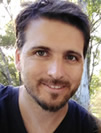 Dr. Nicola is a Research Assistant Professor of the Argentine National Scientific and Technical Research Council performing research activities at the National University of Córdoba (Argentina). Dr. Nicola obtained his PhD at National University of Córdoba in 2010. His PhD thesis, in the laboratory of Dr. Ana María Masini-Repiso, focused on the discovery of the functional expression of Toll-like receptor 4 as the mediator of lipopolysaccharide-induced effects in thyroid cells. During his PhD training, he received the Latin American Thyroid Society young investigator award. In 2011, Dr. Nicola joined Dr. Nancy Carrasco’s laboratory (Yale School of Medicine) to pursue superb postdoctoral training. His research addressed mechanistic questions about how the Na+/I- symporter (NIS) uses Na+ to drive active I- transport, and focused on identifying those residues involved in substrate binding. Dr. Nicola returned to the National University of Córdoba in 2013 to conduct a second postdoctoral experience under the direction of Dr. José Luis Bocco. His work aimed to elucidate the role of the tumor suppressor Krüppel-like factor 6 in BRAFV600E-promoted carcinogenesis. Currently, Dr. Nicola is interested in understanding the molecular mechanisms involved in NIS plasma membrane targeting, as radioiodide therapy for the treatment of differentiated thyroid cancer is ultimately dependent on cell surface NIS expression in thyroid tumor cells. Press Release
Dr. Nicola is a Research Assistant Professor of the Argentine National Scientific and Technical Research Council performing research activities at the National University of Córdoba (Argentina). Dr. Nicola obtained his PhD at National University of Córdoba in 2010. His PhD thesis, in the laboratory of Dr. Ana María Masini-Repiso, focused on the discovery of the functional expression of Toll-like receptor 4 as the mediator of lipopolysaccharide-induced effects in thyroid cells. During his PhD training, he received the Latin American Thyroid Society young investigator award. In 2011, Dr. Nicola joined Dr. Nancy Carrasco’s laboratory (Yale School of Medicine) to pursue superb postdoctoral training. His research addressed mechanistic questions about how the Na+/I- symporter (NIS) uses Na+ to drive active I- transport, and focused on identifying those residues involved in substrate binding. Dr. Nicola returned to the National University of Córdoba in 2013 to conduct a second postdoctoral experience under the direction of Dr. José Luis Bocco. His work aimed to elucidate the role of the tumor suppressor Krüppel-like factor 6 in BRAFV600E-promoted carcinogenesis. Currently, Dr. Nicola is interested in understanding the molecular mechanisms involved in NIS plasma membrane targeting, as radioiodide therapy for the treatment of differentiated thyroid cancer is ultimately dependent on cell surface NIS expression in thyroid tumor cells. Press Release
2015 ThyCa ATA Grant – Thyroid Cancer
Cancer Progression and Therapeutic Response in a Mouse Model of Medullary Thyroid Carcinoma
Sarah Oltmann, MD – University of Texas Southwestern, Dallas, TX
 Sarah Catherine Oltmann graduated with her BA in Biology, cum laude from Baylor University. She subsequently obtained her Medical Doctorate at Texas Tech University Health Science Center, graduating Alpha Omega Alpha. She pursued her General Surgery residency at the University of Texas Southwestern Medical Center, during which she completed a two-year post-doctoral fellowship, researching estrogen receptor signaling.
Sarah Catherine Oltmann graduated with her BA in Biology, cum laude from Baylor University. She subsequently obtained her Medical Doctorate at Texas Tech University Health Science Center, graduating Alpha Omega Alpha. She pursued her General Surgery residency at the University of Texas Southwestern Medical Center, during which she completed a two-year post-doctoral fellowship, researching estrogen receptor signaling.
After her residency, Dr. Oltmann completed a two-year fellowship in Endocrine Surgery at the University of Wisconsin. During this time, she specialized in the minimally invasive surgical management of thyroid, parathyroid and adrenal disorders. Her research during this time focused on the kinetics of parathyroid hormone decline during parathyroidectomy, calcium supplementation after thyroidectomy for Graves’ disease, and use of surgeon performed ultrasound in the evaluation of N0 thyroid cancer patients.
She joined the faculty of the University of Texas Southwestern Medical Center in August of 2014, as an assistant professor and as the director of Endocrine Surgery at Parkland Memorial Hospital. Her research interests include the management of thyroid cancer, surgical options for hyperthyroidism, intraoperative parathyroid hormone kinetics during parathyroidectomy, and surgeon decision making regarding adrenalectomy. Press Release
2015 ThyCa ATA Grant – Thyroid Cancer
Studying the Genetic Basis of Advanced Differentiated Thyroid Cancer by Forward Genetics Screening with Thyroid-specific Random Transposon Insertional Mutagenesis
Ming Li, MD, PhD – Phoenix VA Health Care System, Phoenix AZ
 Dr. Ming Li completed his medical training at Beijing Medical University, in Beijing, China, in 1999. Driven by his passion for science, he then pursued and earned a Ph.D. in Baylor College of Medicine under Dr. Lawrence Chan, and studied glucose-mediated gene transcription. He returned to medicine in 2009 when he joined the Physician Scientist Training Program at University of Minnesota, first as a resident, then an endocrinology fellow. He decided to devote his research to thyroid cancer, recognizing an opportunity to make a great impact to the care of thyroid cancer. He joined the lab of Dr. David Largaespada, a world leader in cancer genetics, in 2012. His work on a murine model of advance thyroid cancer has earned him an outstanding abstract award in Endocrine Society’s 2014 Annual Meeting, and helped him acquire an academic appointment to Phoenix VA Healthcare System to continue his research in thyroid cancer, after his fellowship ends in June 2015. He is a proud member of American Thyroid Association. When not doing research or seeing patients, he enjoys playing with his twin boys Howard and Brian, reading a book of wisdom, and playing an ancient Chinese board game known as “weiqi”.
Dr. Ming Li completed his medical training at Beijing Medical University, in Beijing, China, in 1999. Driven by his passion for science, he then pursued and earned a Ph.D. in Baylor College of Medicine under Dr. Lawrence Chan, and studied glucose-mediated gene transcription. He returned to medicine in 2009 when he joined the Physician Scientist Training Program at University of Minnesota, first as a resident, then an endocrinology fellow. He decided to devote his research to thyroid cancer, recognizing an opportunity to make a great impact to the care of thyroid cancer. He joined the lab of Dr. David Largaespada, a world leader in cancer genetics, in 2012. His work on a murine model of advance thyroid cancer has earned him an outstanding abstract award in Endocrine Society’s 2014 Annual Meeting, and helped him acquire an academic appointment to Phoenix VA Healthcare System to continue his research in thyroid cancer, after his fellowship ends in June 2015. He is a proud member of American Thyroid Association. When not doing research or seeing patients, he enjoys playing with his twin boys Howard and Brian, reading a book of wisdom, and playing an ancient Chinese board game known as “weiqi”.
Press Release
2014 ThyCa ATA Grant – Thyroid Cancer
Fusion Oncogenes as Drivers of Medullary Thyroid Cancer
Elizabeth Grubbs, MD – The University of Texas M. D. Anderson Cancer Center, Houston, TX
 Dr. Grubbs graduated from Duke University Medical School in 1999 during which time she was awarded a Howard Hughes Medical Institute Training Grant. During her General Surgery Residency at Duke University (1999-2006) she spent 2 years in a basic science laboratory performing research through a training National Research Service Award from the National Institutes of Health. After her 2-year Surgical Oncology Fellowship at University of Texas M.D. Anderson Cancer Center (MDACC) she came on faculty at MDACC in 2008. In the 5.5 years since taking this first faculty position she has received a 1-year career development award from the Head and Neck SPORE grant led by MDACC, a 1-year career development award from the Thyroid SPORE grant led by Ohio State University and MDACC and more recently a 5-year American Cancer Society Mentored Scholar Grant.
Dr. Grubbs graduated from Duke University Medical School in 1999 during which time she was awarded a Howard Hughes Medical Institute Training Grant. During her General Surgery Residency at Duke University (1999-2006) she spent 2 years in a basic science laboratory performing research through a training National Research Service Award from the National Institutes of Health. After her 2-year Surgical Oncology Fellowship at University of Texas M.D. Anderson Cancer Center (MDACC) she came on faculty at MDACC in 2008. In the 5.5 years since taking this first faculty position she has received a 1-year career development award from the Head and Neck SPORE grant led by MDACC, a 1-year career development award from the Thyroid SPORE grant led by Ohio State University and MDACC and more recently a 5-year American Cancer Society Mentored Scholar Grant.
Press Release
2014 ThyCa ATA Grant – Thyroid Cancer
Development of a High Throughput in vivo Screening System for Small Molecule Activators of Thyroid Differentiation: Identification and Targeting of New Molecular Pathways Involved Thyroid Cancer Progression
Jason Prescott, MD, PhD – Johns Hopkins School of Medicine, Baltimore, MD
 Jason Prescott, MD PhD, is an Assistant Professor of Surgery and of Oncology at the Johns Hopkins School of Medicine in Baltimore, MD, where he is also an Attending Endocrine Surgeon. Dr. Prescott completed his medical doctorate (2004) and doctorate of philosophy in molecular biology (2006) through the NIH-funded Medical Scientist Training Program at the University of Colorado. He then matriculated into the Yale University General Surgery residency program, which he completed in 2011, and followed this with formal fellowship training in Endocrine Surgery at the Massachusetts General Hospital/Harvard Medical School in Boston, MA. Dr. Prescott’s lab is developing a Zebrafish animal model of undifferentiated thyroid cancer that has been designed to facilitate rapid, high throughput identification of new anticancer medications and, at the same time, allow elucidation of new subcellular molecular pathways that contribute to thyroid oncogenesis. Using this system, Dr. Prescott and his team not only intend to discover new mechanisms underlying the development of undifferentiated thyroid cancer, but also to directly improve the care of patients suffering from this disease.
Jason Prescott, MD PhD, is an Assistant Professor of Surgery and of Oncology at the Johns Hopkins School of Medicine in Baltimore, MD, where he is also an Attending Endocrine Surgeon. Dr. Prescott completed his medical doctorate (2004) and doctorate of philosophy in molecular biology (2006) through the NIH-funded Medical Scientist Training Program at the University of Colorado. He then matriculated into the Yale University General Surgery residency program, which he completed in 2011, and followed this with formal fellowship training in Endocrine Surgery at the Massachusetts General Hospital/Harvard Medical School in Boston, MA. Dr. Prescott’s lab is developing a Zebrafish animal model of undifferentiated thyroid cancer that has been designed to facilitate rapid, high throughput identification of new anticancer medications and, at the same time, allow elucidation of new subcellular molecular pathways that contribute to thyroid oncogenesis. Using this system, Dr. Prescott and his team not only intend to discover new mechanisms underlying the development of undifferentiated thyroid cancer, but also to directly improve the care of patients suffering from this disease.
Press Release
2014 ThyCa ATA Grant – Thyroid Cancer
Mechanisms of Response and Resistance to Farnesyltransferase Inhibition in HRAS-driven Thyroid Tumors
Brian Untch, MD – Memorial Sloan-Kettering Cancer Center, New York, NY
 Brian R. Untch, MD is a surgeon-scientist at Memorial Sloan Kettering Cancer Center focused on endocrine and neuroendocrine tumors and malignancies. As a surgeon on both the Head and Neck and the Gastric and Mixed Tumor Services, his goal is to advance the knowledge and treatment options for patients with these conditions. Dr. Untch is from Chicago, Illinois where he attended medical school at Loyola University Medical Center. He then underwent general surgery residency training at Duke University and also completed a surgical oncology research fellowship studying mechanisms of calcium set point changes in hyperparathyroidism in the lab of John Olson, MD, PhD. After residency, he came to New York for a clinical fellowship in surgical oncology at Memorial Sloan Kettering Cancer Center. He was then asked to join the faculty. In the laboratory, Dr. Untch studies the pathogenesis of thyroid cancer and responses to therapy under the mentorship of James Fagin, MD, Chief of the Endocrinology Service and Member of the Human Oncology and Pathogenesis Program.
Brian R. Untch, MD is a surgeon-scientist at Memorial Sloan Kettering Cancer Center focused on endocrine and neuroendocrine tumors and malignancies. As a surgeon on both the Head and Neck and the Gastric and Mixed Tumor Services, his goal is to advance the knowledge and treatment options for patients with these conditions. Dr. Untch is from Chicago, Illinois where he attended medical school at Loyola University Medical Center. He then underwent general surgery residency training at Duke University and also completed a surgical oncology research fellowship studying mechanisms of calcium set point changes in hyperparathyroidism in the lab of John Olson, MD, PhD. After residency, he came to New York for a clinical fellowship in surgical oncology at Memorial Sloan Kettering Cancer Center. He was then asked to join the faculty. In the laboratory, Dr. Untch studies the pathogenesis of thyroid cancer and responses to therapy under the mentorship of James Fagin, MD, Chief of the Endocrinology Service and Member of the Human Oncology and Pathogenesis Program.
Press Release
2013 ThyCa ATA Grant – Thyroid Cancer
Overexpression of LGR4 and LGR5 in Human Thyroid Cancer Promotes Wnt/β-Catenin Signaling and is Associated with Tumor Aggressiveness
Brittany Bohinc Henderson, MD, PhD
Duke University, Durham, North Carolina
Currently at Charleston Thyroid Center, Charleston, South Carolina

Brittany Henderson, MD, ECNU is board-certified in internal medicine and endocrinology, with advanced training in thyroid disorders, including Hashimoto’s thyroiditis, Graves Disease, thyroid nodules, and thyroid cancer. Originally from Cleveland, Ohio, she graduated in the top 10% of at her class at Northeastern Ohio Medical University, where she received the honor of Alpha Omega Alpha (AOA). She completed her endocrinology fellowship training under a National Institutes of Health (NIH) research-training grant at Duke University Medical Center. She then served as Medical Director for the Thyroid and Endocrine Tumor Board at Duke University Medical Center and as Clinical Director for the Thyroid and Endocrine Neoplasia Clinic at Wake Forest University Baptist Medical Center. She has received multiple prestigious grants from the American Thyroid Association (ATA) and ThyCa (Thyroid Cancer Survivors’ Association, Inc.). Her work has been featured on the cover of Thyroid and in many other scientific journals including Endocrinology, Gut, and Oncotarget. She desires to improve quality of life for those living with thyroid disease both through novel research and medical guidance. For patients living with Hashimoto’s disease, she believes that knowledge is power. Her clinical practice is dedicated to patients with thyroid disease. She specializes in autoimmune thyroid disease, thyroid nodules, thyroid cancer, ethanol ablation, and advanced minimally invasive techniques. In addition to using a mainstream medical approach, Dr. Henderson also uses complementary medicine to explore underlying root causes of thyroid disease. Her clinical practice is located in sunny Charleston, South Carolina and is called The Charleston Thyroid Center (www.charlestonthyroid.com). Press Release
2013 ThyCa ATA Grant – Thyroid Cancer
Overcoming Resistance to RET inhibitors in Medullary Thyroid Cancer
Nicole G. Chau, MD
Dana-Farber Cancer Institute – Boston, MA
 Dr. Nicole Chau received her medical degree and completed residencies in Internal Medicine and Medical Oncology at the University of Toronto, Canada. She is a medical oncologist in the Head and Neck Oncology Program at the Dana-Farber Cancer Institute/Brigham and Women’s Hospital and Instructor in Medicine at Harvard Medical School. She is the recipient of a ThyCa grant for her research project entitled ‘Overcoming resistance to RET inhibitors in medullary thyroid carcinoma (MTC).’ Dr. Chau and colleagues will examine the efficacy of current and novel RET inhibitors against specific oncogenic RET mutations in MTC. Her project will explore whether novel agents can overcome mechanisms of resistance to current RET inhibitors. Press Release
Dr. Nicole Chau received her medical degree and completed residencies in Internal Medicine and Medical Oncology at the University of Toronto, Canada. She is a medical oncologist in the Head and Neck Oncology Program at the Dana-Farber Cancer Institute/Brigham and Women’s Hospital and Instructor in Medicine at Harvard Medical School. She is the recipient of a ThyCa grant for her research project entitled ‘Overcoming resistance to RET inhibitors in medullary thyroid carcinoma (MTC).’ Dr. Chau and colleagues will examine the efficacy of current and novel RET inhibitors against specific oncogenic RET mutations in MTC. Her project will explore whether novel agents can overcome mechanisms of resistance to current RET inhibitors. Press Release
2013 ThyCa ATA Grant – Thyroid Cancer
Analysis of locus 14q13.3 in search of mutations predisposing to Papillary Thyroid Carcinoma (PTC)
Jaroslaw Piotr Jendrzejewski, MD
Ohio State University – Columbus, OH
 Dr. Jaroslaw Jendrzejewski graduated from The Medical University of Gdansk in Poland receiving a Medical Doctor degree in 1998. He completed his internship and internal medicine residency at the Department of Hypertension and Diabetology Medical University of Gdansk. During his medical training he gained a thorough and broad clinical experience in internal medicine. The focus of his clinical interests was on endocrine disorders (particularly diabetes and thyroid diseases). In 2008 he joined Dr. Albert de la Chapelle’s research team at The Ohio State University as a postdoctoral researcher. Dr. Jendrzejewski’s research area is the molecular biology of papillary thyroid cancer, specifically the role of single nucleotide polymorphisms and non-coding RNAs in thyroid cancer pathogenesis. Dr Jendrzejewski is board certified in internal medicine (2007). He is a member of the American Thyroid Association, and he is the author or co-author of several peer reviewed publications related to thyroid cancer. He received the Scientific Award of Medicine from The Medical University of Gdansk for his accomplishments in clinical research (2009). Press Release
Dr. Jaroslaw Jendrzejewski graduated from The Medical University of Gdansk in Poland receiving a Medical Doctor degree in 1998. He completed his internship and internal medicine residency at the Department of Hypertension and Diabetology Medical University of Gdansk. During his medical training he gained a thorough and broad clinical experience in internal medicine. The focus of his clinical interests was on endocrine disorders (particularly diabetes and thyroid diseases). In 2008 he joined Dr. Albert de la Chapelle’s research team at The Ohio State University as a postdoctoral researcher. Dr. Jendrzejewski’s research area is the molecular biology of papillary thyroid cancer, specifically the role of single nucleotide polymorphisms and non-coding RNAs in thyroid cancer pathogenesis. Dr Jendrzejewski is board certified in internal medicine (2007). He is a member of the American Thyroid Association, and he is the author or co-author of several peer reviewed publications related to thyroid cancer. He received the Scientific Award of Medicine from The Medical University of Gdansk for his accomplishments in clinical research (2009). Press Release
2012 ThyCa ATA Grant – Thyroid Cancer
Sorafenib and quinacrine as potential combination for anaplastic thyroid carcinoma
Niklas Finnberg, PhD
Pennsylvania State Hershey Cancer Institute, Hershey, Pennsylvania
 Dr. Finnberg started his research career in 1998 when he joined Dr. Johan Högberg’s group as a graduate student at the Institute of Environmental Medicine (IEM), Karolinska Institutet, Stockholm, Sweden. He was introduced to both the basic science aspect of toxicology and the translation of basic scientific discovery to application in regulatory toxicology. During his time at IEM, Dr. Finnberg was acquainted to the tumor suppressor gene p53 in DNA damage signaling in animal models of chemical hepatocarcinogenesis. As a post-doctoral fellow, Dr. Finnberg chose to focus on cancer research in Dr. Wafik El-Deiry’s laboratory, University of Pennsylvania, PA. In Dr. El-Deiry’s laboratory, he characterized the in vivo role of the p53-regulated drug target receptor DR5 in regulating cell death, inflammation and cancer. At the time of publication, the in vivo role of the DR5 receptor in DNA damage signaling and cancer etiology where unknown to the research community despite a high interest for the DR5 receptors potential in cancer therapy. Dr. Finnberg was appointed a senior investigator position in Dr. El-Deiry’ laboratory (2008-2010) and remained focused on DNA damage signaling. He was part of a collaboration with Dr. Ann Kennedy’s laboratory during which he became a member of the Brookhaven National Laboratory and performed animal experiments at the NASA Space Radiation Laboratory (NSRL), Brookhaven, NY. The experiments performed at NSRL where one of the first to compare global gene expression changes in hem atopoietic organs following gamma- and proton-radiation exposure that were associated with radiation-induced toxicity in vivo. In March 2010 Dr. Finnberg joined Penn State Hershey Cancer Institute (PSHCI) and the Experimental Therapeutics branch as an Assistant Professor where he is focused on pursuing translational research that aim to improve therapy for patients with brain, colorectal, hematologic and thyroid cancers.
Dr. Finnberg started his research career in 1998 when he joined Dr. Johan Högberg’s group as a graduate student at the Institute of Environmental Medicine (IEM), Karolinska Institutet, Stockholm, Sweden. He was introduced to both the basic science aspect of toxicology and the translation of basic scientific discovery to application in regulatory toxicology. During his time at IEM, Dr. Finnberg was acquainted to the tumor suppressor gene p53 in DNA damage signaling in animal models of chemical hepatocarcinogenesis. As a post-doctoral fellow, Dr. Finnberg chose to focus on cancer research in Dr. Wafik El-Deiry’s laboratory, University of Pennsylvania, PA. In Dr. El-Deiry’s laboratory, he characterized the in vivo role of the p53-regulated drug target receptor DR5 in regulating cell death, inflammation and cancer. At the time of publication, the in vivo role of the DR5 receptor in DNA damage signaling and cancer etiology where unknown to the research community despite a high interest for the DR5 receptors potential in cancer therapy. Dr. Finnberg was appointed a senior investigator position in Dr. El-Deiry’ laboratory (2008-2010) and remained focused on DNA damage signaling. He was part of a collaboration with Dr. Ann Kennedy’s laboratory during which he became a member of the Brookhaven National Laboratory and performed animal experiments at the NASA Space Radiation Laboratory (NSRL), Brookhaven, NY. The experiments performed at NSRL where one of the first to compare global gene expression changes in hem atopoietic organs following gamma- and proton-radiation exposure that were associated with radiation-induced toxicity in vivo. In March 2010 Dr. Finnberg joined Penn State Hershey Cancer Institute (PSHCI) and the Experimental Therapeutics branch as an Assistant Professor where he is focused on pursuing translational research that aim to improve therapy for patients with brain, colorectal, hematologic and thyroid cancers.
2012 ThyCa ATA Grant – Thyroid Cancer
The role of Ras versus Raf in thyroid cancer development and progression
Aime Franco, PhD
University of Arkansas for Medical Science, Little Rock, Arkansas
 Aime Franco is an Assistant Professor in the Department of Physiology and Biophysics at the University of Arkansas for Medical Sciences in Little Rock, Arkansas. Her laboratory is investigating the role of MAPK signaling in epithelial derived cancers, using mouse models of thyroid cancer to explore the role of activated MAPK signaling in disease. Her current work is investigating the differential roles of Braf versus Ras activation in thyroid tumorigenesis and how we can exploit these differences to develop novel therapeutic strategies for the treatment of thyroid cancer, especially poorly-differentiated and anaplastic tumors. Dr. Franco’s lab works closely with physicians in the UAMS Thyroid Cancer Clinic to translate laboratory findings into the clinic. In addition to her work in bench science, Dr. Franco is a member of the Science Policy and Legislative Affairs Committee for the American Association for Cancer Research, passionately advocating for cancer research. Prior to her appointment at UAMS, Dr. Franco completed a postdoctoral fellowship at Memorial Sloan-Kettering Cancer Center. She holds a Ph.D. in Cancer Biology from Vanderbilt University, a Master of Science in Nutritional Sciences from the University of Connecticut at Storrs, and a Bachelor of Science in Sports Medicine and Athletic Training from the University of Connecticut at Storrs. In addition to Dr. Franco’s research and policy work in the field of cancer, she is also a cancer survivor, being diagnosed and treated for follicular thyroid cancer in 1999.
Aime Franco is an Assistant Professor in the Department of Physiology and Biophysics at the University of Arkansas for Medical Sciences in Little Rock, Arkansas. Her laboratory is investigating the role of MAPK signaling in epithelial derived cancers, using mouse models of thyroid cancer to explore the role of activated MAPK signaling in disease. Her current work is investigating the differential roles of Braf versus Ras activation in thyroid tumorigenesis and how we can exploit these differences to develop novel therapeutic strategies for the treatment of thyroid cancer, especially poorly-differentiated and anaplastic tumors. Dr. Franco’s lab works closely with physicians in the UAMS Thyroid Cancer Clinic to translate laboratory findings into the clinic. In addition to her work in bench science, Dr. Franco is a member of the Science Policy and Legislative Affairs Committee for the American Association for Cancer Research, passionately advocating for cancer research. Prior to her appointment at UAMS, Dr. Franco completed a postdoctoral fellowship at Memorial Sloan-Kettering Cancer Center. She holds a Ph.D. in Cancer Biology from Vanderbilt University, a Master of Science in Nutritional Sciences from the University of Connecticut at Storrs, and a Bachelor of Science in Sports Medicine and Athletic Training from the University of Connecticut at Storrs. In addition to Dr. Franco’s research and policy work in the field of cancer, she is also a cancer survivor, being diagnosed and treated for follicular thyroid cancer in 1999.
2012 ThyCa ATA Grant
Study the role of natural killer cells in anaplastic thyroid carcinoma
Andreas E. Lundqvist, PhD
Karolinska Institute Stockholm, Sweden
 During my PhD training (1998-2003) at Karolinska Institutet in Stockholm, Sweden I was involved in research to genetically modify dendritic cells to express tumor antigens for priming of anti-tumor T cell responses. During this time I published a total of twelve papers including six first author papers and two review articles. In these, we assessed several important factors that may contribute to a better outcome in DC therapy. In 2003, when I commenced my post-doctoral studies at the National Institutes of Health I developed murine models of cancer. My studies focused on using natural killer (NK) cells to improve the outcome of allogeneic HCT as well as to develop therapies using autologous NK cells. Based on my results, a clinical phase I trial in patients with metastatic tumors was initiated in 2008. Approximately two years into my tenure at NIH I was awarded a staff scientist position at the Hematology Branch to be able to establish a more independent research program. During my tenure at the NIH I published a total of 18 papers. In October or 2009, I returned to Karolinska Institutet and Cancer Center Karolinska in Stockholm, Sweden to establish my own laboratory. We currently focus on how to improve T and NK cell based immune therapy. Our ultimate goal is to develop clinical studies of adoptive cell therapy against cancer.
During my PhD training (1998-2003) at Karolinska Institutet in Stockholm, Sweden I was involved in research to genetically modify dendritic cells to express tumor antigens for priming of anti-tumor T cell responses. During this time I published a total of twelve papers including six first author papers and two review articles. In these, we assessed several important factors that may contribute to a better outcome in DC therapy. In 2003, when I commenced my post-doctoral studies at the National Institutes of Health I developed murine models of cancer. My studies focused on using natural killer (NK) cells to improve the outcome of allogeneic HCT as well as to develop therapies using autologous NK cells. Based on my results, a clinical phase I trial in patients with metastatic tumors was initiated in 2008. Approximately two years into my tenure at NIH I was awarded a staff scientist position at the Hematology Branch to be able to establish a more independent research program. During my tenure at the NIH I published a total of 18 papers. In October or 2009, I returned to Karolinska Institutet and Cancer Center Karolinska in Stockholm, Sweden to establish my own laboratory. We currently focus on how to improve T and NK cell based immune therapy. Our ultimate goal is to develop clinical studies of adoptive cell therapy against cancer.
2011 ThyCa ATA Grant – Thyroid Cancer
A PI3K based phophoproteome signature to predict prognosis and response to therapy in BRAF mutant papillary thyroid carcinoma
Naifa Busaidy, MD
University of Texas MD Anderson Cancer Center Houston, Texas
 Dr. Busaidy is an Associate Professor in the Department of Endocrine Neoplasia & Hormonal Disorders at the University of Texas – M.D. Anderson Cancer Center (UTMDACC). She received her medical degree from Baylor College of Medicine and completed her clinical and research training at MD Anderson. Her clinical and research interests encompass investigating molecular signatures in metastatic noniodine avid papillary thyroid carcinomas with the hope to improve the treatment options and care of the patients with this disease. Dr. Busaidy is a principal & co-investigator on several NCI and industry sponsored clinical trials aimed at improving patient outcomes with progressive metastatic thyroid cancer. She was selected to be on the NCI’s task force for revision of the Common Toxicity Criteria for Adverse Events, version 4. She also was invited to serve on a subcommittee of the NCI’s Investigational Drug Steering Committe, tasked with evaluating the metabolic toxicities of the PI3K/mTOR/aKT inhibitors. These many rich collaborative environments afford her a unique and comprehensive understanding of the potential and adverse effects of these targeted agents. Press Release
Dr. Busaidy is an Associate Professor in the Department of Endocrine Neoplasia & Hormonal Disorders at the University of Texas – M.D. Anderson Cancer Center (UTMDACC). She received her medical degree from Baylor College of Medicine and completed her clinical and research training at MD Anderson. Her clinical and research interests encompass investigating molecular signatures in metastatic noniodine avid papillary thyroid carcinomas with the hope to improve the treatment options and care of the patients with this disease. Dr. Busaidy is a principal & co-investigator on several NCI and industry sponsored clinical trials aimed at improving patient outcomes with progressive metastatic thyroid cancer. She was selected to be on the NCI’s task force for revision of the Common Toxicity Criteria for Adverse Events, version 4. She also was invited to serve on a subcommittee of the NCI’s Investigational Drug Steering Committe, tasked with evaluating the metabolic toxicities of the PI3K/mTOR/aKT inhibitors. These many rich collaborative environments afford her a unique and comprehensive understanding of the potential and adverse effects of these targeted agents. Press Release
2011 ThyCa ATA Grant – Medullary Thyroid Cancer
The Role of the Translocator Protein (TSPO) in the Thyroid Cancer Response to the Treatment
Joanna Klubo-Gwiezdzinska, PhD
Washington Hospital Center/Georgetown University Washington, DC
Currently at National Institutes of Health, Bethesda, Maryland
 Joanna Klubo-Gwiezdzinska, MD, PhD, MHSc holds the faculty appointment at the National Institutes of Health, National Institute of Diabetes and Digestive and Kidney Disease. She received her medical degree and clinical training in internal medicine from Nicolaus Copernicus University Collegium Medicum in Bydgoszcz, Poland. She completed her internal medicine training at Georgetown University/Washington Hospital Center, Washington DC and endocrine fellowship at the National Institutes of Health, Bethesda, MD. She also holds a Master’s Degree in Clinical Research from Duke University, Durham, NC. Dr Klubo-Gwiezdzinska is currently serving as a Chief of the Thyroid Nodules, Cancer and Functional Thyroid Disorders Section at the National Institutes of Health. Her research involves translational and clinical studies focused on the optimization of thyroid nodules and thyroid cancer diagnosis, as well as appropriate risk stratification and therapy aimed at improving patients’ morbidity and mortality. Her team is working on the cross-talk between signaling pathways and cancer metabolism. Dr Klubo-Gwiezdzinska’s lab found that mitochondrial glycerophosphate dehydrogenase (mGPDH) is one of the targets of an anti-diabetic drug – metformin in thyroid cancer. Her team continues to investigate a molecular and metabolic signature of thyroid cancer, which could be targeted by agents affecting cancer metabolism. Dr Klubo-Gwiezdzinska is a recipient of several awards to include Endocrine Society’s International Endocrine Scholars Award for Outstanding Achievements in Endocrinology, Endocrine Fellows Foundation Grant, Endocrine Society’s Thyroid Clinical Research Fellowship & Mentor Award and Lasker Clinical Research Tenure Track Scholarship from the National Institutes of Health. Press Release
Joanna Klubo-Gwiezdzinska, MD, PhD, MHSc holds the faculty appointment at the National Institutes of Health, National Institute of Diabetes and Digestive and Kidney Disease. She received her medical degree and clinical training in internal medicine from Nicolaus Copernicus University Collegium Medicum in Bydgoszcz, Poland. She completed her internal medicine training at Georgetown University/Washington Hospital Center, Washington DC and endocrine fellowship at the National Institutes of Health, Bethesda, MD. She also holds a Master’s Degree in Clinical Research from Duke University, Durham, NC. Dr Klubo-Gwiezdzinska is currently serving as a Chief of the Thyroid Nodules, Cancer and Functional Thyroid Disorders Section at the National Institutes of Health. Her research involves translational and clinical studies focused on the optimization of thyroid nodules and thyroid cancer diagnosis, as well as appropriate risk stratification and therapy aimed at improving patients’ morbidity and mortality. Her team is working on the cross-talk between signaling pathways and cancer metabolism. Dr Klubo-Gwiezdzinska’s lab found that mitochondrial glycerophosphate dehydrogenase (mGPDH) is one of the targets of an anti-diabetic drug – metformin in thyroid cancer. Her team continues to investigate a molecular and metabolic signature of thyroid cancer, which could be targeted by agents affecting cancer metabolism. Dr Klubo-Gwiezdzinska is a recipient of several awards to include Endocrine Society’s International Endocrine Scholars Award for Outstanding Achievements in Endocrinology, Endocrine Fellows Foundation Grant, Endocrine Society’s Thyroid Clinical Research Fellowship & Mentor Award and Lasker Clinical Research Tenure Track Scholarship from the National Institutes of Health. Press Release
2011 ThyCa ATA Grant – Thyroid Cancer
Targeting BRAFV600E with an orally available selective inhibitor in novel in vitro and in vivo preclinical models of human papillary thyroid cancer
Carmelo Nucera, MD, PhD
Beth Israel Deaconess Medical Center (Harvard Medical School) Boston, Massachusetts
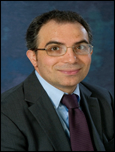 Dr. Nucera received his MD and PhD “summa cum laude” from the Medical School of the University of Messina, Italy. He did his residency in Endocrinology and Metabolic Diseases at the same University, studying novel clinical associations in congenital idiopathic hypoparathyroidism (DiGeorge Syndrome). During this time, he also generated a novel transgenic mouse model to trace thyroid hormone action in vivo during embryo-fetal development (at the Medical School Agostino Gemelli in Roma). Press Release
Dr. Nucera received his MD and PhD “summa cum laude” from the Medical School of the University of Messina, Italy. He did his residency in Endocrinology and Metabolic Diseases at the same University, studying novel clinical associations in congenital idiopathic hypoparathyroidism (DiGeorge Syndrome). During this time, he also generated a novel transgenic mouse model to trace thyroid hormone action in vivo during embryo-fetal development (at the Medical School Agostino Gemelli in Roma). Press Release
2010 ThyCa ATA Grant – Medullary Thyroid Cancer
Activating transcription factor 4 (ATF4), a novel putative tumor suppressor gene in medullary thyroid cancer
Rozita Bagheri-Yarmand, PhD
The University of Texas M D Anderson Cancer Center, Houston, Texas
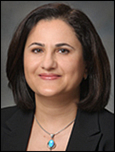 Dr. Bagheri Yarmand is currently an Assistant Professor in the Department of Endocrine Neoplasia and Hormonal Disorders – Research, The University of Texas MD Anderson Cancer Center, Houston, TX. Her interests include mouse models, gene targeting, oncogenes, tumor suppressors, cell cycle, apoptosis, tyrosine kinase receptors, signal transduction, breast cancer, medullary thyroid cancer. Dr. Yarmand began her studies in 1987 at the University of Paris XIII until she completed her PhD. After her first year of training she moved to Houston, Texas to complete her post-doctoral fellowship at the University of Texas MD Anderson Cancer Center.
Dr. Bagheri Yarmand is currently an Assistant Professor in the Department of Endocrine Neoplasia and Hormonal Disorders – Research, The University of Texas MD Anderson Cancer Center, Houston, TX. Her interests include mouse models, gene targeting, oncogenes, tumor suppressors, cell cycle, apoptosis, tyrosine kinase receptors, signal transduction, breast cancer, medullary thyroid cancer. Dr. Yarmand began her studies in 1987 at the University of Paris XIII until she completed her PhD. After her first year of training she moved to Houston, Texas to complete her post-doctoral fellowship at the University of Texas MD Anderson Cancer Center.
2010 ThyCa ATA Grant – Thyroid Cancer
The role of MADD, an IG20 gene splice variant, and its potential use as therapeutic target in the anaplastic thyroid cancer
Tania Pilli, MD, PhD
University of Illinois at Chicago, Chicago, Illinois
 Dr. Tania Pilli obtained her medical degree at the University of Siena in 1999. After her post-graduate training in Endocrinology and Metabolism at the same institution (1999-2004), Dr. Pilli pursued a research fellowship in cancer biology and autoimmunity in the Section of Endocrinology at the University of Siena. Since her appointment in this institution, Dr. Pilli has been involved in both clinical practice and research, with an emphasis on thyroid cancer.
Dr. Tania Pilli obtained her medical degree at the University of Siena in 1999. After her post-graduate training in Endocrinology and Metabolism at the same institution (1999-2004), Dr. Pilli pursued a research fellowship in cancer biology and autoimmunity in the Section of Endocrinology at the University of Siena. Since her appointment in this institution, Dr. Pilli has been involved in both clinical practice and research, with an emphasis on thyroid cancer.
2009 ThyCa ATA Grant
Dually Targeting the MAP Kinase and PI3K Pathways in Thyroid Cancer – Testing of a Novel Therapeutic Approach
Dingxie Liu MD, PhD
The Johns Hopkins Medical Institutions, Baltimore, MD
 Dr. Dingxie Liu came from southern China, where He received his M.D. and Ph.D. in 2000. He Joined Johns Hopkins University School of Medicine in 2005 as a postdoctoral fellow and became a faculty member at the same institution in 2009. Dr. Liu’s interests include molecular pathology of thyroid cancer and melanoma, cancer targeted therapy and cancer bioinformatics. Currently he focuses on designing and testing novel combination strategies for targeted therapy of thyroid cancer basing on microarray-based pathway profiling data.
Dr. Dingxie Liu came from southern China, where He received his M.D. and Ph.D. in 2000. He Joined Johns Hopkins University School of Medicine in 2005 as a postdoctoral fellow and became a faculty member at the same institution in 2009. Dr. Liu’s interests include molecular pathology of thyroid cancer and melanoma, cancer targeted therapy and cancer bioinformatics. Currently he focuses on designing and testing novel combination strategies for targeted therapy of thyroid cancer basing on microarray-based pathway profiling data.
2009 ThyCa ATA Grant – Medullary Thyroid Cancer
Somatostatin-coupled Nanoparticles for Imaging and Therapy of Medullary Thyroid Cancer
Martin A. Walter, MD
University Hospital, Basel, Switzerland
Currently at University Hospital Geneva, Geneva, Switzerland
 Martin A. Walter, MDattended the medical schools of Muenster (Germany), London (UK) and Zurich (Switzerland). After graduation he did his residency in the Divisions of Nuclear Medicine and Endocrinology at the University Hospital Basel (Switzerland). Starting in his first year of residency he was involved in several clinical research projects on the treatment of benign and malignant thyroid diseases, resulting e.g. in the first meta-analysis on the combined use of radioiodine and anti-thyroid drugs. Encouraged by the success of radioisotope delivery into differentiated thyroid cancer cells, Dr. Walter became involved into research projects aimed to deliver radioisotopes also into other tumors. One of the most prominent examples of this concept of internal radiotherapy is the implementation of the radiolabeled somatostatin analogue DOTATOC for the treatment of medullary thyroid cancer and other tumors. Since 2018 Martin Walter is a full professor at the Faculty of Medicine of the University of Geneva and head of the nuclear medicine and molecular imaging department at Geneva University Hospital. His research is dedicated to the development and clinical translation of new radiotracers towards a defined patient benefit.
Martin A. Walter, MDattended the medical schools of Muenster (Germany), London (UK) and Zurich (Switzerland). After graduation he did his residency in the Divisions of Nuclear Medicine and Endocrinology at the University Hospital Basel (Switzerland). Starting in his first year of residency he was involved in several clinical research projects on the treatment of benign and malignant thyroid diseases, resulting e.g. in the first meta-analysis on the combined use of radioiodine and anti-thyroid drugs. Encouraged by the success of radioisotope delivery into differentiated thyroid cancer cells, Dr. Walter became involved into research projects aimed to deliver radioisotopes also into other tumors. One of the most prominent examples of this concept of internal radiotherapy is the implementation of the radiolabeled somatostatin analogue DOTATOC for the treatment of medullary thyroid cancer and other tumors. Since 2018 Martin Walter is a full professor at the Faculty of Medicine of the University of Geneva and head of the nuclear medicine and molecular imaging department at Geneva University Hospital. His research is dedicated to the development and clinical translation of new radiotracers towards a defined patient benefit.
2008 ThyCa ATA Grant – Thyroid Cancer
Regulation of Sodium/Iodide Symporter (NIS) Gene Expression in Thyroid Cancer
Michael S. Fenton, PhD
West Los Angeles VA Medical Center, Los Angeles, California
 Dr. Mike Fenton earned a B.S. with a major in Biochemistry from UCLA in 1997. Dr. Fenton received a Ph.D. in Biochemistry and Molecular Biology in 2003 from UCLA. He continued his advanced education with a Postdoctoral Fellowship at UCLA. Mike joined the Chemistry faculty at LA Mission College. Currently, Mike is the Honors Program director and has a function on the advisory board for the LAMC Title III and V grants.
Dr. Mike Fenton earned a B.S. with a major in Biochemistry from UCLA in 1997. Dr. Fenton received a Ph.D. in Biochemistry and Molecular Biology in 2003 from UCLA. He continued his advanced education with a Postdoctoral Fellowship at UCLA. Mike joined the Chemistry faculty at LA Mission College. Currently, Mike is the Honors Program director and has a function on the advisory board for the LAMC Title III and V grants.
Press Release
2008 ThyCa ATA Grant – Medullary Thyroid Cancer
Identification of microRNA (miRNA) Target Genes in Human Medullary Thyroid Cancer: A Specific Role of miRNAs to Promote Invasion and Metastasis
Libero Santarpia, MD, PhD
The University of Texas MD Anderson Cancer Center, Houston, Texas
 Libero Santarpia MD, PhD is Assistant Professor and Director of a Translational Unit Laboratory within the Department of Oncology at the Tuscan Tumor Institute, Italy. He is currently appointed as Visiting Assistant Professor within the Department of Endocrine Neoplasia and Pathology at The University of Texas, M.D. Anderson Cancer Center, USA. Dr. Santarpia obtained his MD and PhD in Molecular Endocrinology in Italy and pursued research fellowships in Naples (Italy), Heidelberg, Barcelona, and Houston. Most of his career and research is devoted to understand thyroid and neuroendocrine disorders, with a special emphasis on the molecular genetics of thyroid carcinomas. Dr. Santarpia’s research interest is to identify new genetic markers of disease for better personalized treatments. He is a recipient of an American Thyroid Association-ATA ThyCa-Grant identifying microRNAs, gene targets and new mechanisms of tumorigenesis and metastases in human medullary thyroid carcinoma.
Libero Santarpia MD, PhD is Assistant Professor and Director of a Translational Unit Laboratory within the Department of Oncology at the Tuscan Tumor Institute, Italy. He is currently appointed as Visiting Assistant Professor within the Department of Endocrine Neoplasia and Pathology at The University of Texas, M.D. Anderson Cancer Center, USA. Dr. Santarpia obtained his MD and PhD in Molecular Endocrinology in Italy and pursued research fellowships in Naples (Italy), Heidelberg, Barcelona, and Houston. Most of his career and research is devoted to understand thyroid and neuroendocrine disorders, with a special emphasis on the molecular genetics of thyroid carcinomas. Dr. Santarpia’s research interest is to identify new genetic markers of disease for better personalized treatments. He is a recipient of an American Thyroid Association-ATA ThyCa-Grant identifying microRNAs, gene targets and new mechanisms of tumorigenesis and metastases in human medullary thyroid carcinoma.
Press Release
2007 ThyCa ATA Grant – Thyroid Cancer
The Role of miR146a in PTC
Krystian Jazdzewski, MD, PhD
Ohio State University, Columbus, Ohio
 Dr. Krystian Jazdzewski, is the head of the Genomic Medicine at Medical University of Warsaw. He also holds a position of Research Assistant Professor in the Department of Molecular Virology, Immunology & Medical Genetics at the Ohio State University. Dr. Jazdzewski is an internationally recognized expert in the field of microRNA and genetic predisposition to human cancers. Dr. Jazdzewski has published 13 peer-reviewed papers, including PNAS (2005, 2008, 2009), Cell Cycle (2009), JCEM (2008, 2011, 2011), Thyroid (2005) with more than 700 citations.
Dr. Krystian Jazdzewski, is the head of the Genomic Medicine at Medical University of Warsaw. He also holds a position of Research Assistant Professor in the Department of Molecular Virology, Immunology & Medical Genetics at the Ohio State University. Dr. Jazdzewski is an internationally recognized expert in the field of microRNA and genetic predisposition to human cancers. Dr. Jazdzewski has published 13 peer-reviewed papers, including PNAS (2005, 2008, 2009), Cell Cycle (2009), JCEM (2008, 2011, 2011), Thyroid (2005) with more than 700 citations.
Press Release
2007 ThyCa ATA Grant – Medullary Thyroid Cancer
The Role of Tumor-Associated Macrophages on Thyroid Cancer Progression
Mabel Ryder, MD
Memorial Sloan-Kettering Cancer Center, New York, New York
 Mabel Ryder, MD, is an Assistant Attending in Endocrinology at Memorial Sloan-Kettering Cancer Center, I manage a broad spectrum of patients with both low and high risk thyroid cancer as well as patients with benign and malignant adrenal related disorders. In the laboratory, my research is focused on examining the role of the tumor microenvironment in thyroid cancer progression. Using mouse models of BRAF induced papillary thyroid cancer (PTC), we have demonstrated that tumor-associated macrophages (TAMs) facilitate PTC initiation and progression. During PTC initiation, TAMs stimulate expansion of tumor promoting cancer-associated myofibroblasts, a novel observation for any cancer type. We have demonstrated that targeting TAMs pharmacologically in murine PTCs impairs thyroid cancer progression. This has relevant therapeutic implications for patients with advanced radioiodine refractory thyroid cancer whose thyroid cancers are often densely infiltrated with TAMs.
Mabel Ryder, MD, is an Assistant Attending in Endocrinology at Memorial Sloan-Kettering Cancer Center, I manage a broad spectrum of patients with both low and high risk thyroid cancer as well as patients with benign and malignant adrenal related disorders. In the laboratory, my research is focused on examining the role of the tumor microenvironment in thyroid cancer progression. Using mouse models of BRAF induced papillary thyroid cancer (PTC), we have demonstrated that tumor-associated macrophages (TAMs) facilitate PTC initiation and progression. During PTC initiation, TAMs stimulate expansion of tumor promoting cancer-associated myofibroblasts, a novel observation for any cancer type. We have demonstrated that targeting TAMs pharmacologically in murine PTCs impairs thyroid cancer progression. This has relevant therapeutic implications for patients with advanced radioiodine refractory thyroid cancer whose thyroid cancers are often densely infiltrated with TAMs.
Press Release
2006 ATA ThyCa Grant – Medullary Thyroid Cancer
Xianmin Xia, PhD – The Johns Hopkins University School of Medicine, Baltimore, Maryland
Targeting p55PIK phosphoinositide-3 kinase (PI 3-kinase) in the Treatment of Human Thyroid Cancers
2006 ATA ThyCa Grant – Thyroid Cancer
Lionel Groussin, MD, PhD – Cochin Institute, Paris, France
Regulation and Expression of Dual Specificity Phosphatases in Papillary Thyroid Carcinoma
2005 ThyCa ATA Grant – Medullary Thyroid Cancer
Induction of Cytotoxic Immunity in Medullary Thyroid Carcinoma by Dendritic
Matthias Schott, MD
Heinrich-Heine-University of Duesseldorf, Duesseldorf, Germany
 Matthias Schott is currently a Professor at the University Hospital Düsseldorf, Head of the Division for Specific Endocrinology Department of Endocrinology and Diabetes. Dr. Schott’s key expertise is in the field of autoimmune thyroid diseases as well as in the field of endocrine malignancies. He performed a multitude of different studies for the diagnostic of autoimmune diseases as well as cell transfer studies for the treatment of autoimmune and malignant endocrine diseases. This has been done in animal models as well as in humans. Matthias Schott is member of many organizations, most importantly he is member of the research committee of the American Thyroid Association.
Matthias Schott is currently a Professor at the University Hospital Düsseldorf, Head of the Division for Specific Endocrinology Department of Endocrinology and Diabetes. Dr. Schott’s key expertise is in the field of autoimmune thyroid diseases as well as in the field of endocrine malignancies. He performed a multitude of different studies for the diagnostic of autoimmune diseases as well as cell transfer studies for the treatment of autoimmune and malignant endocrine diseases. This has been done in animal models as well as in humans. Matthias Schott is member of many organizations, most importantly he is member of the research committee of the American Thyroid Association.
2005 ThyCa ATA Grant – Thyroid Cancer
Radiation Response Genotype & Risk of Papillary Thyroid Cancer: A Case-Control Study.
Erich Sturgis, MD, FACS
The University of Texas MD Anderson Cancer Center, Houston, Texas
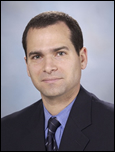 Erich Sturgis, MD received a Bachelor of Science degree in biochemistry cum laude from L.S.U., and he attended Georgetown University School of Medicine graduating cum laude with a Medical Doctorate in 1990. He was a general surgery intern at Tulane University and Charity Hospital and subsequently, a research fellow in head and neck oncology at Memorial Sloan-Kettering Cancer Center. Dr. Sturgis completed a residency in Otolaryngology-Head and Neck Surgery at Tulane University in 1996 and became certified by the American Board of Otolaryngology in 1997. After a head and neck surgery fellowship at Vrije University in Amsterdam, he completed a two-year research fellowship in molecular epidemiology at The University of Texas-M.D. Anderson Cancer Center followed by a one-year clinical fellowship in head and neck surgery. In 2000, he joined the faculty of the Department of Head and Neck Surgery as an assistant professor with a joint appointment in Epidemiology at The University of Texas-M.D. Anderson Cancer Center. He completed a Master of Public Health at The University of Texas Health Science Center at Houston School of Public Health in 2004 and was promoted to associate professor with tenure in 2005 and full professor with tenure in 2010.
Erich Sturgis, MD received a Bachelor of Science degree in biochemistry cum laude from L.S.U., and he attended Georgetown University School of Medicine graduating cum laude with a Medical Doctorate in 1990. He was a general surgery intern at Tulane University and Charity Hospital and subsequently, a research fellow in head and neck oncology at Memorial Sloan-Kettering Cancer Center. Dr. Sturgis completed a residency in Otolaryngology-Head and Neck Surgery at Tulane University in 1996 and became certified by the American Board of Otolaryngology in 1997. After a head and neck surgery fellowship at Vrije University in Amsterdam, he completed a two-year research fellowship in molecular epidemiology at The University of Texas-M.D. Anderson Cancer Center followed by a one-year clinical fellowship in head and neck surgery. In 2000, he joined the faculty of the Department of Head and Neck Surgery as an assistant professor with a joint appointment in Epidemiology at The University of Texas-M.D. Anderson Cancer Center. He completed a Master of Public Health at The University of Texas Health Science Center at Houston School of Public Health in 2004 and was promoted to associate professor with tenure in 2005 and full professor with tenure in 2010.
2004 ThyCa ATA Grant
Antiangiogenic Therapy of Thyroid Cancer
Sareh Parangi, MD
Beth Israel Deaconess Medical Center, Boston, Massachusetts
 Dr. Sareh Parangi is an Associate Professor of Surgery at Harvard Medical School, Massachusetts General Hospital. She is a busy endocrine surgeon with an interest in aggressive thyroid cancers. An ATA Thyca awardee for 2005, she was able to leverage those funds to become an RO1 funded physician scientist at the MGH. Dr. Parangi has been able to balance her passion for translational research with innovative and compassionate care to patients with complex thyroid diseases. Her work in thyroid cancer details certain key genetic changes seen more frequently in those who do poorly, to help elucidate the role of these genetic changes in the aggressive behavior of those cancers. This important research effort focuses on clarifying the molecular mechanism of thyroid cancer invasion and understanding the process of disease progression in patients with thyroid cancer. Therapeutic strategies being currently tested include rational combinatorial therapies, anti-apoptotic strategies and studying underlying mechanisms of resistance to BRAF inhibitors.
Dr. Sareh Parangi is an Associate Professor of Surgery at Harvard Medical School, Massachusetts General Hospital. She is a busy endocrine surgeon with an interest in aggressive thyroid cancers. An ATA Thyca awardee for 2005, she was able to leverage those funds to become an RO1 funded physician scientist at the MGH. Dr. Parangi has been able to balance her passion for translational research with innovative and compassionate care to patients with complex thyroid diseases. Her work in thyroid cancer details certain key genetic changes seen more frequently in those who do poorly, to help elucidate the role of these genetic changes in the aggressive behavior of those cancers. This important research effort focuses on clarifying the molecular mechanism of thyroid cancer invasion and understanding the process of disease progression in patients with thyroid cancer. Therapeutic strategies being currently tested include rational combinatorial therapies, anti-apoptotic strategies and studying underlying mechanisms of resistance to BRAF inhibitors.
2003 ThyCa ATA Grant
BRAF Gene Mutation and the Oncogenesis of Papillary Thyroid Carcinomas
Xiulong Xu, PhD
Rush Presbyterian St. Luke’s Medical Center, Chicago, Illinois
 Dr. Xiulong Xu is an assistant professor in the Department of General Surgery at Rush University Medical Center in Chicago, Illinois. He studied Veterinary Medicine in Yangzhou University from 1980-1984 and earned a Ph.D. degree in 1990 from Nanjing Agricultural University, P. R. China. Dr. Xu received his training in virology and immunology in Ludwig-Maximilians-Universität, Munich, Germany, and Rush University, Chicago. Dr. Xu became a faculty at Rush University since 1996. The main focus of Dr. Xu’s research includes tumor biology, immunology, and diabetes.
Dr. Xiulong Xu is an assistant professor in the Department of General Surgery at Rush University Medical Center in Chicago, Illinois. He studied Veterinary Medicine in Yangzhou University from 1980-1984 and earned a Ph.D. degree in 1990 from Nanjing Agricultural University, P. R. China. Dr. Xu received his training in virology and immunology in Ludwig-Maximilians-Universität, Munich, Germany, and Rush University, Chicago. Dr. Xu became a faculty at Rush University since 1996. The main focus of Dr. Xu’s research includes tumor biology, immunology, and diabetes.


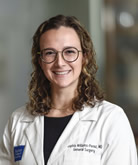
 Aditya Shirali, MD, Assistant Professor, University of Florida
Aditya Shirali, MD, Assistant Professor, University of Florida Thomas Szabo Yamashita, MD, Assistant Professor, Emory School of Medicine
Thomas Szabo Yamashita, MD, Assistant Professor, Emory School of Medicine

 Iñigo Landa, PhD – Instructor in Medicine, Brigham and Women’s Hospital, Boston, MA, United States
Iñigo Landa, PhD – Instructor in Medicine, Brigham and Women’s Hospital, Boston, MA, United States Julio Ricarte Filho, PhD – Research Fellow, Children’s Hospital of Philadelphia, Philadelphia, Pennsylvania, United States
Julio Ricarte Filho, PhD – Research Fellow, Children’s Hospital of Philadelphia, Philadelphia, Pennsylvania, United States Theodora Pappa, MD, PhD – clinical/research postdoctoral fellow, Brigham and Women’s Hospital, Boston, MA. United States
Theodora Pappa, MD, PhD – clinical/research postdoctoral fellow, Brigham and Women’s Hospital, Boston, MA. United States Eman Toraih, MD, PhD, MS – Associate Professor, New Orleans, Louisiana, United States
Eman Toraih, MD, PhD, MS – Associate Professor, New Orleans, Louisiana, United States
 Dr. Priya Dedhia, MD, PhD is an Assistant Professor in the Division of Surgical Oncology at the Ohio State University. Her clinical and research efforts focus on improving treatment options available to patients with thyroid cancer. Her background in cancer biology and generation of patient-derived organoids uniquely positions her to develop models for difficult to study endocrine cancers. She envisions that patient-derived endocrine cancer organoids can elucidate the mechanisms of oncogenic transformation and ultimately facilitate a personalized approach to treatment.
Dr. Priya Dedhia, MD, PhD is an Assistant Professor in the Division of Surgical Oncology at the Ohio State University. Her clinical and research efforts focus on improving treatment options available to patients with thyroid cancer. Her background in cancer biology and generation of patient-derived organoids uniquely positions her to develop models for difficult to study endocrine cancers. She envisions that patient-derived endocrine cancer organoids can elucidate the mechanisms of oncogenic transformation and ultimately facilitate a personalized approach to treatment. Jennifer H. Kuo, MD – Columbia University, New York, NY
Jennifer H. Kuo, MD – Columbia University, New York, NY Leila Shobab, MD – MedStar Washington Hospital Center, Washington, DC
Leila Shobab, MD – MedStar Washington Hospital Center, Washington, DC Myriem Boufraqech, PhD – NCI/NIH, Bethesda, Maryland
Myriem Boufraqech, PhD – NCI/NIH, Bethesda, Maryland Jennifer Wang, MD, ScM – University of Texas MD Anderson Cancer Center, Houston, Texas
Jennifer Wang, MD, ScM – University of Texas MD Anderson Cancer Center, Houston, Texas Vivian Weiss, MD, PhD -Vanderbilt University Medical Center, Nashville, Tennessee
Vivian Weiss, MD, PhD -Vanderbilt University Medical Center, Nashville, Tennessee
 Wayne Miles, Ph.D. – The Ohio State University, Columbus, OH
Wayne Miles, Ph.D. – The Ohio State University, Columbus, OH Glenn J. Hanna, M.D. – Dana-Farber Cancer Institute / Brigham & Women’s Hospital, Boston, MA 02215
Glenn J. Hanna, M.D. – Dana-Farber Cancer Institute / Brigham & Women’s Hospital, Boston, MA 02215 Jens Lohr, MD, PhD – Dana-Farber Cancer Institute, Boston, MA
Jens Lohr, MD, PhD – Dana-Farber Cancer Institute, Boston, MA Vicki Emma Smith, PhD – University of Birmingham, Edgbaston, Birmingham, UK
Vicki Emma Smith, PhD – University of Birmingham, Edgbaston, Birmingham, UK



 Dr. Nicola is a Research Assistant Professor of the Argentine National Scientific and Technical Research Council performing research activities at the National University of Córdoba (Argentina). Dr. Nicola obtained his PhD at National University of Córdoba in 2010. His PhD thesis, in the laboratory of Dr. Ana María Masini-Repiso, focused on the discovery of the functional expression of Toll-like receptor 4 as the mediator of lipopolysaccharide-induced effects in thyroid cells. During his PhD training, he received the Latin American Thyroid Society young investigator award. In 2011, Dr. Nicola joined Dr. Nancy Carrasco’s laboratory (Yale School of Medicine) to pursue superb postdoctoral training. His research addressed mechanistic questions about how the Na+/I- symporter (NIS) uses Na+ to drive active I- transport, and focused on identifying those residues involved in substrate binding. Dr. Nicola returned to the National University of Córdoba in 2013 to conduct a second postdoctoral experience under the direction of Dr. José Luis Bocco. His work aimed to elucidate the role of the tumor suppressor Krüppel-like factor 6 in BRAFV600E-promoted carcinogenesis. Currently, Dr. Nicola is interested in understanding the molecular mechanisms involved in NIS plasma membrane targeting, as radioiodide therapy for the treatment of differentiated thyroid cancer is ultimately dependent on cell surface NIS expression in thyroid tumor cells.
Dr. Nicola is a Research Assistant Professor of the Argentine National Scientific and Technical Research Council performing research activities at the National University of Córdoba (Argentina). Dr. Nicola obtained his PhD at National University of Córdoba in 2010. His PhD thesis, in the laboratory of Dr. Ana María Masini-Repiso, focused on the discovery of the functional expression of Toll-like receptor 4 as the mediator of lipopolysaccharide-induced effects in thyroid cells. During his PhD training, he received the Latin American Thyroid Society young investigator award. In 2011, Dr. Nicola joined Dr. Nancy Carrasco’s laboratory (Yale School of Medicine) to pursue superb postdoctoral training. His research addressed mechanistic questions about how the Na+/I- symporter (NIS) uses Na+ to drive active I- transport, and focused on identifying those residues involved in substrate binding. Dr. Nicola returned to the National University of Córdoba in 2013 to conduct a second postdoctoral experience under the direction of Dr. José Luis Bocco. His work aimed to elucidate the role of the tumor suppressor Krüppel-like factor 6 in BRAFV600E-promoted carcinogenesis. Currently, Dr. Nicola is interested in understanding the molecular mechanisms involved in NIS plasma membrane targeting, as radioiodide therapy for the treatment of differentiated thyroid cancer is ultimately dependent on cell surface NIS expression in thyroid tumor cells. Sarah Catherine Oltmann graduated with her BA in Biology, cum laude from Baylor University. She subsequently obtained her Medical Doctorate at Texas Tech University Health Science Center, graduating Alpha Omega Alpha. She pursued her General Surgery residency at the University of Texas Southwestern Medical Center, during which she completed a two-year post-doctoral fellowship, researching estrogen receptor signaling.
Sarah Catherine Oltmann graduated with her BA in Biology, cum laude from Baylor University. She subsequently obtained her Medical Doctorate at Texas Tech University Health Science Center, graduating Alpha Omega Alpha. She pursued her General Surgery residency at the University of Texas Southwestern Medical Center, during which she completed a two-year post-doctoral fellowship, researching estrogen receptor signaling. Dr. Ming Li completed his medical training at Beijing Medical University, in Beijing, China, in 1999. Driven by his passion for science, he then pursued and earned a Ph.D. in Baylor College of Medicine under Dr. Lawrence Chan, and studied glucose-mediated gene transcription. He returned to medicine in 2009 when he joined the Physician Scientist Training Program at University of Minnesota, first as a resident, then an endocrinology fellow. He decided to devote his research to thyroid cancer, recognizing an opportunity to make a great impact to the care of thyroid cancer. He joined the lab of Dr. David Largaespada, a world leader in cancer genetics, in 2012. His work on a murine model of advance thyroid cancer has earned him an outstanding abstract award in Endocrine Society’s 2014 Annual Meeting, and helped him acquire an academic appointment to Phoenix VA Healthcare System to continue his research in thyroid cancer, after his fellowship ends in June 2015. He is a proud member of American Thyroid Association. When not doing research or seeing patients, he enjoys playing with his twin boys Howard and Brian, reading a book of wisdom, and playing an ancient Chinese board game known as “weiqi”.
Dr. Ming Li completed his medical training at Beijing Medical University, in Beijing, China, in 1999. Driven by his passion for science, he then pursued and earned a Ph.D. in Baylor College of Medicine under Dr. Lawrence Chan, and studied glucose-mediated gene transcription. He returned to medicine in 2009 when he joined the Physician Scientist Training Program at University of Minnesota, first as a resident, then an endocrinology fellow. He decided to devote his research to thyroid cancer, recognizing an opportunity to make a great impact to the care of thyroid cancer. He joined the lab of Dr. David Largaespada, a world leader in cancer genetics, in 2012. His work on a murine model of advance thyroid cancer has earned him an outstanding abstract award in Endocrine Society’s 2014 Annual Meeting, and helped him acquire an academic appointment to Phoenix VA Healthcare System to continue his research in thyroid cancer, after his fellowship ends in June 2015. He is a proud member of American Thyroid Association. When not doing research or seeing patients, he enjoys playing with his twin boys Howard and Brian, reading a book of wisdom, and playing an ancient Chinese board game known as “weiqi”. Dr. Grubbs graduated from Duke University Medical School in 1999 during which time she was awarded a Howard Hughes Medical Institute Training Grant. During her General Surgery Residency at Duke University (1999-2006) she spent 2 years in a basic science laboratory performing research through a training National Research Service Award from the National Institutes of Health. After her 2-year Surgical Oncology Fellowship at University of Texas M.D. Anderson Cancer Center (MDACC) she came on faculty at MDACC in 2008. In the 5.5 years since taking this first faculty position she has received a 1-year career development award from the Head and Neck SPORE grant led by MDACC, a 1-year career development award from the Thyroid SPORE grant led by Ohio State University and MDACC and more recently a 5-year American Cancer Society Mentored Scholar Grant.
Dr. Grubbs graduated from Duke University Medical School in 1999 during which time she was awarded a Howard Hughes Medical Institute Training Grant. During her General Surgery Residency at Duke University (1999-2006) she spent 2 years in a basic science laboratory performing research through a training National Research Service Award from the National Institutes of Health. After her 2-year Surgical Oncology Fellowship at University of Texas M.D. Anderson Cancer Center (MDACC) she came on faculty at MDACC in 2008. In the 5.5 years since taking this first faculty position she has received a 1-year career development award from the Head and Neck SPORE grant led by MDACC, a 1-year career development award from the Thyroid SPORE grant led by Ohio State University and MDACC and more recently a 5-year American Cancer Society Mentored Scholar Grant. Jason Prescott, MD PhD, is an Assistant Professor of Surgery and of Oncology at the Johns Hopkins School of Medicine in Baltimore, MD, where he is also an Attending Endocrine Surgeon. Dr. Prescott completed his medical doctorate (2004) and doctorate of philosophy in molecular biology (2006) through the NIH-funded Medical Scientist Training Program at the University of Colorado. He then matriculated into the Yale University General Surgery residency program, which he completed in 2011, and followed this with formal fellowship training in Endocrine Surgery at the Massachusetts General Hospital/Harvard Medical School in Boston, MA. Dr. Prescott’s lab is developing a Zebrafish animal model of undifferentiated thyroid cancer that has been designed to facilitate rapid, high throughput identification of new anticancer medications and, at the same time, allow elucidation of new subcellular molecular pathways that contribute to thyroid oncogenesis. Using this system, Dr. Prescott and his team not only intend to discover new mechanisms underlying the development of undifferentiated thyroid cancer, but also to directly improve the care of patients suffering from this disease.
Jason Prescott, MD PhD, is an Assistant Professor of Surgery and of Oncology at the Johns Hopkins School of Medicine in Baltimore, MD, where he is also an Attending Endocrine Surgeon. Dr. Prescott completed his medical doctorate (2004) and doctorate of philosophy in molecular biology (2006) through the NIH-funded Medical Scientist Training Program at the University of Colorado. He then matriculated into the Yale University General Surgery residency program, which he completed in 2011, and followed this with formal fellowship training in Endocrine Surgery at the Massachusetts General Hospital/Harvard Medical School in Boston, MA. Dr. Prescott’s lab is developing a Zebrafish animal model of undifferentiated thyroid cancer that has been designed to facilitate rapid, high throughput identification of new anticancer medications and, at the same time, allow elucidation of new subcellular molecular pathways that contribute to thyroid oncogenesis. Using this system, Dr. Prescott and his team not only intend to discover new mechanisms underlying the development of undifferentiated thyroid cancer, but also to directly improve the care of patients suffering from this disease. Brian R. Untch, MD is a surgeon-scientist at Memorial Sloan Kettering Cancer Center focused on endocrine and neuroendocrine tumors and malignancies. As a surgeon on both the Head and Neck and the Gastric and Mixed Tumor Services, his goal is to advance the knowledge and treatment options for patients with these conditions. Dr. Untch is from Chicago, Illinois where he attended medical school at Loyola University Medical Center. He then underwent general surgery residency training at Duke University and also completed a surgical oncology research fellowship studying mechanisms of calcium set point changes in hyperparathyroidism in the lab of John Olson, MD, PhD. After residency, he came to New York for a clinical fellowship in surgical oncology at Memorial Sloan Kettering Cancer Center. He was then asked to join the faculty. In the laboratory, Dr. Untch studies the pathogenesis of thyroid cancer and responses to therapy under the mentorship of James Fagin, MD, Chief of the Endocrinology Service and Member of the Human Oncology and Pathogenesis Program.
Brian R. Untch, MD is a surgeon-scientist at Memorial Sloan Kettering Cancer Center focused on endocrine and neuroendocrine tumors and malignancies. As a surgeon on both the Head and Neck and the Gastric and Mixed Tumor Services, his goal is to advance the knowledge and treatment options for patients with these conditions. Dr. Untch is from Chicago, Illinois where he attended medical school at Loyola University Medical Center. He then underwent general surgery residency training at Duke University and also completed a surgical oncology research fellowship studying mechanisms of calcium set point changes in hyperparathyroidism in the lab of John Olson, MD, PhD. After residency, he came to New York for a clinical fellowship in surgical oncology at Memorial Sloan Kettering Cancer Center. He was then asked to join the faculty. In the laboratory, Dr. Untch studies the pathogenesis of thyroid cancer and responses to therapy under the mentorship of James Fagin, MD, Chief of the Endocrinology Service and Member of the Human Oncology and Pathogenesis Program.


 Dr. Finnberg started his research career in 1998 when he joined Dr. Johan Högberg’s group as a graduate student at the Institute of Environmental Medicine (IEM), Karolinska Institutet, Stockholm, Sweden. He was introduced to both the basic science aspect of toxicology and the translation of basic scientific discovery to application in regulatory toxicology. During his time at IEM, Dr. Finnberg was acquainted to the tumor suppressor gene p53 in DNA damage signaling in animal models of chemical hepatocarcinogenesis. As a post-doctoral fellow, Dr. Finnberg chose to focus on cancer research in Dr. Wafik El-Deiry’s laboratory, University of Pennsylvania, PA. In Dr. El-Deiry’s laboratory, he characterized the in vivo role of the p53-regulated drug target receptor DR5 in regulating cell death, inflammation and cancer. At the time of publication, the in vivo role of the DR5 receptor in DNA damage signaling and cancer etiology where unknown to the research community despite a high interest for the DR5 receptors potential in cancer therapy. Dr. Finnberg was appointed a senior investigator position in Dr. El-Deiry’ laboratory (2008-2010) and remained focused on DNA damage signaling. He was part of a collaboration with Dr. Ann Kennedy’s laboratory during which he became a member of the Brookhaven National Laboratory and performed animal experiments at the NASA Space Radiation Laboratory (NSRL), Brookhaven, NY. The experiments performed at NSRL where one of the first to compare global gene expression changes in hem atopoietic organs following gamma- and proton-radiation exposure that were associated with radiation-induced toxicity in vivo. In March 2010 Dr. Finnberg joined Penn State Hershey Cancer Institute (PSHCI) and the Experimental Therapeutics branch as an Assistant Professor where he is focused on pursuing translational research that aim to improve therapy for patients with brain, colorectal, hematologic and thyroid cancers.
Dr. Finnberg started his research career in 1998 when he joined Dr. Johan Högberg’s group as a graduate student at the Institute of Environmental Medicine (IEM), Karolinska Institutet, Stockholm, Sweden. He was introduced to both the basic science aspect of toxicology and the translation of basic scientific discovery to application in regulatory toxicology. During his time at IEM, Dr. Finnberg was acquainted to the tumor suppressor gene p53 in DNA damage signaling in animal models of chemical hepatocarcinogenesis. As a post-doctoral fellow, Dr. Finnberg chose to focus on cancer research in Dr. Wafik El-Deiry’s laboratory, University of Pennsylvania, PA. In Dr. El-Deiry’s laboratory, he characterized the in vivo role of the p53-regulated drug target receptor DR5 in regulating cell death, inflammation and cancer. At the time of publication, the in vivo role of the DR5 receptor in DNA damage signaling and cancer etiology where unknown to the research community despite a high interest for the DR5 receptors potential in cancer therapy. Dr. Finnberg was appointed a senior investigator position in Dr. El-Deiry’ laboratory (2008-2010) and remained focused on DNA damage signaling. He was part of a collaboration with Dr. Ann Kennedy’s laboratory during which he became a member of the Brookhaven National Laboratory and performed animal experiments at the NASA Space Radiation Laboratory (NSRL), Brookhaven, NY. The experiments performed at NSRL where one of the first to compare global gene expression changes in hem atopoietic organs following gamma- and proton-radiation exposure that were associated with radiation-induced toxicity in vivo. In March 2010 Dr. Finnberg joined Penn State Hershey Cancer Institute (PSHCI) and the Experimental Therapeutics branch as an Assistant Professor where he is focused on pursuing translational research that aim to improve therapy for patients with brain, colorectal, hematologic and thyroid cancers. Aime Franco is an Assistant Professor in the Department of Physiology and Biophysics at the University of Arkansas for Medical Sciences in Little Rock, Arkansas. Her laboratory is investigating the role of MAPK signaling in epithelial derived cancers, using mouse models of thyroid cancer to explore the role of activated MAPK signaling in disease. Her current work is investigating the differential roles of Braf versus Ras activation in thyroid tumorigenesis and how we can exploit these differences to develop novel therapeutic strategies for the treatment of thyroid cancer, especially poorly-differentiated and anaplastic tumors. Dr. Franco’s lab works closely with physicians in the UAMS Thyroid Cancer Clinic to translate laboratory findings into the clinic. In addition to her work in bench science, Dr. Franco is a member of the Science Policy and Legislative Affairs Committee for the American Association for Cancer Research, passionately advocating for cancer research. Prior to her appointment at UAMS, Dr. Franco completed a postdoctoral fellowship at Memorial Sloan-Kettering Cancer Center. She holds a Ph.D. in Cancer Biology from Vanderbilt University, a Master of Science in Nutritional Sciences from the University of Connecticut at Storrs, and a Bachelor of Science in Sports Medicine and Athletic Training from the University of Connecticut at Storrs. In addition to Dr. Franco’s research and policy work in the field of cancer, she is also a cancer survivor, being diagnosed and treated for follicular thyroid cancer in 1999.
Aime Franco is an Assistant Professor in the Department of Physiology and Biophysics at the University of Arkansas for Medical Sciences in Little Rock, Arkansas. Her laboratory is investigating the role of MAPK signaling in epithelial derived cancers, using mouse models of thyroid cancer to explore the role of activated MAPK signaling in disease. Her current work is investigating the differential roles of Braf versus Ras activation in thyroid tumorigenesis and how we can exploit these differences to develop novel therapeutic strategies for the treatment of thyroid cancer, especially poorly-differentiated and anaplastic tumors. Dr. Franco’s lab works closely with physicians in the UAMS Thyroid Cancer Clinic to translate laboratory findings into the clinic. In addition to her work in bench science, Dr. Franco is a member of the Science Policy and Legislative Affairs Committee for the American Association for Cancer Research, passionately advocating for cancer research. Prior to her appointment at UAMS, Dr. Franco completed a postdoctoral fellowship at Memorial Sloan-Kettering Cancer Center. She holds a Ph.D. in Cancer Biology from Vanderbilt University, a Master of Science in Nutritional Sciences from the University of Connecticut at Storrs, and a Bachelor of Science in Sports Medicine and Athletic Training from the University of Connecticut at Storrs. In addition to Dr. Franco’s research and policy work in the field of cancer, she is also a cancer survivor, being diagnosed and treated for follicular thyroid cancer in 1999. During my PhD training (1998-2003) at Karolinska Institutet in Stockholm, Sweden I was involved in research to genetically modify dendritic cells to express tumor antigens for priming of anti-tumor T cell responses. During this time I published a total of twelve papers including six first author papers and two review articles. In these, we assessed several important factors that may contribute to a better outcome in DC therapy. In 2003, when I commenced my post-doctoral studies at the National Institutes of Health I developed murine models of cancer. My studies focused on using natural killer (NK) cells to improve the outcome of allogeneic HCT as well as to develop therapies using autologous NK cells. Based on my results, a clinical phase I trial in patients with metastatic tumors was initiated in 2008. Approximately two years into my tenure at NIH I was awarded a staff scientist position at the Hematology Branch to be able to establish a more independent research program. During my tenure at the NIH I published a total of 18 papers. In October or 2009, I returned to Karolinska Institutet and Cancer Center Karolinska in Stockholm, Sweden to establish my own laboratory. We currently focus on how to improve T and NK cell based immune therapy. Our ultimate goal is to develop clinical studies of adoptive cell therapy against cancer.
During my PhD training (1998-2003) at Karolinska Institutet in Stockholm, Sweden I was involved in research to genetically modify dendritic cells to express tumor antigens for priming of anti-tumor T cell responses. During this time I published a total of twelve papers including six first author papers and two review articles. In these, we assessed several important factors that may contribute to a better outcome in DC therapy. In 2003, when I commenced my post-doctoral studies at the National Institutes of Health I developed murine models of cancer. My studies focused on using natural killer (NK) cells to improve the outcome of allogeneic HCT as well as to develop therapies using autologous NK cells. Based on my results, a clinical phase I trial in patients with metastatic tumors was initiated in 2008. Approximately two years into my tenure at NIH I was awarded a staff scientist position at the Hematology Branch to be able to establish a more independent research program. During my tenure at the NIH I published a total of 18 papers. In October or 2009, I returned to Karolinska Institutet and Cancer Center Karolinska in Stockholm, Sweden to establish my own laboratory. We currently focus on how to improve T and NK cell based immune therapy. Our ultimate goal is to develop clinical studies of adoptive cell therapy against cancer.


 Dr. Bagheri Yarmand is currently an Assistant Professor in the Department of Endocrine Neoplasia and Hormonal Disorders – Research, The University of Texas MD Anderson Cancer Center, Houston, TX. Her interests include mouse models, gene targeting, oncogenes, tumor suppressors, cell cycle, apoptosis, tyrosine kinase receptors, signal transduction, breast cancer, medullary thyroid cancer. Dr. Yarmand began her studies in 1987 at the University of Paris XIII until she completed her PhD. After her first year of training she moved to Houston, Texas to complete her post-doctoral fellowship at the University of Texas MD Anderson Cancer Center.
Dr. Bagheri Yarmand is currently an Assistant Professor in the Department of Endocrine Neoplasia and Hormonal Disorders – Research, The University of Texas MD Anderson Cancer Center, Houston, TX. Her interests include mouse models, gene targeting, oncogenes, tumor suppressors, cell cycle, apoptosis, tyrosine kinase receptors, signal transduction, breast cancer, medullary thyroid cancer. Dr. Yarmand began her studies in 1987 at the University of Paris XIII until she completed her PhD. After her first year of training she moved to Houston, Texas to complete her post-doctoral fellowship at the University of Texas MD Anderson Cancer Center. Dr. Tania Pilli obtained her medical degree at the University of Siena in 1999. After her post-graduate training in Endocrinology and Metabolism at the same institution (1999-2004), Dr. Pilli pursued a research fellowship in cancer biology and autoimmunity in the Section of Endocrinology at the University of Siena. Since her appointment in this institution, Dr. Pilli has been involved in both clinical practice and research, with an emphasis on thyroid cancer.
Dr. Tania Pilli obtained her medical degree at the University of Siena in 1999. After her post-graduate training in Endocrinology and Metabolism at the same institution (1999-2004), Dr. Pilli pursued a research fellowship in cancer biology and autoimmunity in the Section of Endocrinology at the University of Siena. Since her appointment in this institution, Dr. Pilli has been involved in both clinical practice and research, with an emphasis on thyroid cancer. Dr. Dingxie Liu came from southern China, where He received his M.D. and Ph.D. in 2000. He Joined Johns Hopkins University School of Medicine in 2005 as a postdoctoral fellow and became a faculty member at the same institution in 2009. Dr. Liu’s interests include molecular pathology of thyroid cancer and melanoma, cancer targeted therapy and cancer bioinformatics. Currently he focuses on designing and testing novel combination strategies for targeted therapy of thyroid cancer basing on microarray-based pathway profiling data.
Dr. Dingxie Liu came from southern China, where He received his M.D. and Ph.D. in 2000. He Joined Johns Hopkins University School of Medicine in 2005 as a postdoctoral fellow and became a faculty member at the same institution in 2009. Dr. Liu’s interests include molecular pathology of thyroid cancer and melanoma, cancer targeted therapy and cancer bioinformatics. Currently he focuses on designing and testing novel combination strategies for targeted therapy of thyroid cancer basing on microarray-based pathway profiling data. Martin A. Walter, MDattended the medical schools of Muenster (Germany), London (UK) and Zurich (Switzerland). After graduation he did his residency in the Divisions of Nuclear Medicine and Endocrinology at the University Hospital Basel (Switzerland). Starting in his first year of residency he was involved in several clinical research projects on the treatment of benign and malignant thyroid diseases, resulting e.g. in the first meta-analysis on the combined use of radioiodine and anti-thyroid drugs. Encouraged by the success of radioisotope delivery into differentiated thyroid cancer cells, Dr. Walter became involved into research projects aimed to deliver radioisotopes also into other tumors. One of the most prominent examples of this concept of internal radiotherapy is the implementation of the radiolabeled somatostatin analogue DOTATOC for the treatment of medullary thyroid cancer and other tumors. Since 2018 Martin Walter is a full professor at the Faculty of Medicine of the University of Geneva and head of the nuclear medicine and molecular imaging department at Geneva University Hospital. His research is dedicated to the development and clinical translation of new radiotracers towards a defined patient benefit.
Martin A. Walter, MDattended the medical schools of Muenster (Germany), London (UK) and Zurich (Switzerland). After graduation he did his residency in the Divisions of Nuclear Medicine and Endocrinology at the University Hospital Basel (Switzerland). Starting in his first year of residency he was involved in several clinical research projects on the treatment of benign and malignant thyroid diseases, resulting e.g. in the first meta-analysis on the combined use of radioiodine and anti-thyroid drugs. Encouraged by the success of radioisotope delivery into differentiated thyroid cancer cells, Dr. Walter became involved into research projects aimed to deliver radioisotopes also into other tumors. One of the most prominent examples of this concept of internal radiotherapy is the implementation of the radiolabeled somatostatin analogue DOTATOC for the treatment of medullary thyroid cancer and other tumors. Since 2018 Martin Walter is a full professor at the Faculty of Medicine of the University of Geneva and head of the nuclear medicine and molecular imaging department at Geneva University Hospital. His research is dedicated to the development and clinical translation of new radiotracers towards a defined patient benefit. Dr. Mike Fenton earned a B.S. with a major in Biochemistry from UCLA in 1997. Dr. Fenton received a Ph.D. in Biochemistry and Molecular Biology in 2003 from UCLA. He continued his advanced education with a Postdoctoral Fellowship at UCLA. Mike joined the Chemistry faculty at LA Mission College. Currently, Mike is the Honors Program director and has a function on the advisory board for the LAMC Title III and V grants.
Dr. Mike Fenton earned a B.S. with a major in Biochemistry from UCLA in 1997. Dr. Fenton received a Ph.D. in Biochemistry and Molecular Biology in 2003 from UCLA. He continued his advanced education with a Postdoctoral Fellowship at UCLA. Mike joined the Chemistry faculty at LA Mission College. Currently, Mike is the Honors Program director and has a function on the advisory board for the LAMC Title III and V grants. Libero Santarpia MD, PhD is Assistant Professor and Director of a Translational Unit Laboratory within the Department of Oncology at the Tuscan Tumor Institute, Italy. He is currently appointed as Visiting Assistant Professor within the Department of Endocrine Neoplasia and Pathology at The University of Texas, M.D. Anderson Cancer Center, USA. Dr. Santarpia obtained his MD and PhD in Molecular Endocrinology in Italy and pursued research fellowships in Naples (Italy), Heidelberg, Barcelona, and Houston. Most of his career and research is devoted to understand thyroid and neuroendocrine disorders, with a special emphasis on the molecular genetics of thyroid carcinomas. Dr. Santarpia’s research interest is to identify new genetic markers of disease for better personalized treatments. He is a recipient of an American Thyroid Association-ATA ThyCa-Grant identifying microRNAs, gene targets and new mechanisms of tumorigenesis and metastases in human medullary thyroid carcinoma.
Libero Santarpia MD, PhD is Assistant Professor and Director of a Translational Unit Laboratory within the Department of Oncology at the Tuscan Tumor Institute, Italy. He is currently appointed as Visiting Assistant Professor within the Department of Endocrine Neoplasia and Pathology at The University of Texas, M.D. Anderson Cancer Center, USA. Dr. Santarpia obtained his MD and PhD in Molecular Endocrinology in Italy and pursued research fellowships in Naples (Italy), Heidelberg, Barcelona, and Houston. Most of his career and research is devoted to understand thyroid and neuroendocrine disorders, with a special emphasis on the molecular genetics of thyroid carcinomas. Dr. Santarpia’s research interest is to identify new genetic markers of disease for better personalized treatments. He is a recipient of an American Thyroid Association-ATA ThyCa-Grant identifying microRNAs, gene targets and new mechanisms of tumorigenesis and metastases in human medullary thyroid carcinoma. Dr. Krystian Jazdzewski, is the head of the Genomic Medicine at Medical University of Warsaw. He also holds a position of Research Assistant Professor in the Department of Molecular Virology, Immunology & Medical Genetics at the Ohio State University. Dr. Jazdzewski is an internationally recognized expert in the field of microRNA and genetic predisposition to human cancers. Dr. Jazdzewski has published 13 peer-reviewed papers, including PNAS (2005, 2008, 2009), Cell Cycle (2009), JCEM (2008, 2011, 2011), Thyroid (2005) with more than 700 citations.
Dr. Krystian Jazdzewski, is the head of the Genomic Medicine at Medical University of Warsaw. He also holds a position of Research Assistant Professor in the Department of Molecular Virology, Immunology & Medical Genetics at the Ohio State University. Dr. Jazdzewski is an internationally recognized expert in the field of microRNA and genetic predisposition to human cancers. Dr. Jazdzewski has published 13 peer-reviewed papers, including PNAS (2005, 2008, 2009), Cell Cycle (2009), JCEM (2008, 2011, 2011), Thyroid (2005) with more than 700 citations. Mabel Ryder, MD, is an Assistant Attending in Endocrinology at Memorial Sloan-Kettering Cancer Center, I manage a broad spectrum of patients with both low and high risk thyroid cancer as well as patients with benign and malignant adrenal related disorders. In the laboratory, my research is focused on examining the role of the tumor microenvironment in thyroid cancer progression. Using mouse models of BRAF induced papillary thyroid cancer (PTC), we have demonstrated that tumor-associated macrophages (TAMs) facilitate PTC initiation and progression. During PTC initiation, TAMs stimulate expansion of tumor promoting cancer-associated myofibroblasts, a novel observation for any cancer type. We have demonstrated that targeting TAMs pharmacologically in murine PTCs impairs thyroid cancer progression. This has relevant therapeutic implications for patients with advanced radioiodine refractory thyroid cancer whose thyroid cancers are often densely infiltrated with TAMs.
Mabel Ryder, MD, is an Assistant Attending in Endocrinology at Memorial Sloan-Kettering Cancer Center, I manage a broad spectrum of patients with both low and high risk thyroid cancer as well as patients with benign and malignant adrenal related disorders. In the laboratory, my research is focused on examining the role of the tumor microenvironment in thyroid cancer progression. Using mouse models of BRAF induced papillary thyroid cancer (PTC), we have demonstrated that tumor-associated macrophages (TAMs) facilitate PTC initiation and progression. During PTC initiation, TAMs stimulate expansion of tumor promoting cancer-associated myofibroblasts, a novel observation for any cancer type. We have demonstrated that targeting TAMs pharmacologically in murine PTCs impairs thyroid cancer progression. This has relevant therapeutic implications for patients with advanced radioiodine refractory thyroid cancer whose thyroid cancers are often densely infiltrated with TAMs. Matthias Schott is currently a Professor at the University Hospital Düsseldorf, Head of the Division for Specific Endocrinology Department of Endocrinology and Diabetes. Dr. Schott’s key expertise is in the field of autoimmune thyroid diseases as well as in the field of endocrine malignancies. He performed a multitude of different studies for the diagnostic of autoimmune diseases as well as cell transfer studies for the treatment of autoimmune and malignant endocrine diseases. This has been done in animal models as well as in humans. Matthias Schott is member of many organizations, most importantly he is member of the research committee of the American Thyroid Association.
Matthias Schott is currently a Professor at the University Hospital Düsseldorf, Head of the Division for Specific Endocrinology Department of Endocrinology and Diabetes. Dr. Schott’s key expertise is in the field of autoimmune thyroid diseases as well as in the field of endocrine malignancies. He performed a multitude of different studies for the diagnostic of autoimmune diseases as well as cell transfer studies for the treatment of autoimmune and malignant endocrine diseases. This has been done in animal models as well as in humans. Matthias Schott is member of many organizations, most importantly he is member of the research committee of the American Thyroid Association. Erich Sturgis, MD received a Bachelor of Science degree in biochemistry cum laude from L.S.U., and he attended Georgetown University School of Medicine graduating cum laude with a Medical Doctorate in 1990. He was a general surgery intern at Tulane University and Charity Hospital and subsequently, a research fellow in head and neck oncology at Memorial Sloan-Kettering Cancer Center. Dr. Sturgis completed a residency in Otolaryngology-Head and Neck Surgery at Tulane University in 1996 and became certified by the American Board of Otolaryngology in 1997. After a head and neck surgery fellowship at Vrije University in Amsterdam, he completed a two-year research fellowship in molecular epidemiology at The University of Texas-M.D. Anderson Cancer Center followed by a one-year clinical fellowship in head and neck surgery. In 2000, he joined the faculty of the Department of Head and Neck Surgery as an assistant professor with a joint appointment in Epidemiology at The University of Texas-M.D. Anderson Cancer Center. He completed a Master of Public Health at The University of Texas Health Science Center at Houston School of Public Health in 2004 and was promoted to associate professor with tenure in 2005 and full professor with tenure in 2010.
Erich Sturgis, MD received a Bachelor of Science degree in biochemistry cum laude from L.S.U., and he attended Georgetown University School of Medicine graduating cum laude with a Medical Doctorate in 1990. He was a general surgery intern at Tulane University and Charity Hospital and subsequently, a research fellow in head and neck oncology at Memorial Sloan-Kettering Cancer Center. Dr. Sturgis completed a residency in Otolaryngology-Head and Neck Surgery at Tulane University in 1996 and became certified by the American Board of Otolaryngology in 1997. After a head and neck surgery fellowship at Vrije University in Amsterdam, he completed a two-year research fellowship in molecular epidemiology at The University of Texas-M.D. Anderson Cancer Center followed by a one-year clinical fellowship in head and neck surgery. In 2000, he joined the faculty of the Department of Head and Neck Surgery as an assistant professor with a joint appointment in Epidemiology at The University of Texas-M.D. Anderson Cancer Center. He completed a Master of Public Health at The University of Texas Health Science Center at Houston School of Public Health in 2004 and was promoted to associate professor with tenure in 2005 and full professor with tenure in 2010. Dr. Sareh Parangi is an Associate Professor of Surgery at Harvard Medical School, Massachusetts General Hospital. She is a busy endocrine surgeon with an interest in aggressive thyroid cancers. An ATA Thyca awardee for 2005, she was able to leverage those funds to become an RO1 funded physician scientist at the MGH. Dr. Parangi has been able to balance her passion for translational research with innovative and compassionate care to patients with complex thyroid diseases. Her work in thyroid cancer details certain key genetic changes seen more frequently in those who do poorly, to help elucidate the role of these genetic changes in the aggressive behavior of those cancers. This important research effort focuses on clarifying the molecular mechanism of thyroid cancer invasion and understanding the process of disease progression in patients with thyroid cancer. Therapeutic strategies being currently tested include rational combinatorial therapies, anti-apoptotic strategies and studying underlying mechanisms of resistance to BRAF inhibitors.
Dr. Sareh Parangi is an Associate Professor of Surgery at Harvard Medical School, Massachusetts General Hospital. She is a busy endocrine surgeon with an interest in aggressive thyroid cancers. An ATA Thyca awardee for 2005, she was able to leverage those funds to become an RO1 funded physician scientist at the MGH. Dr. Parangi has been able to balance her passion for translational research with innovative and compassionate care to patients with complex thyroid diseases. Her work in thyroid cancer details certain key genetic changes seen more frequently in those who do poorly, to help elucidate the role of these genetic changes in the aggressive behavior of those cancers. This important research effort focuses on clarifying the molecular mechanism of thyroid cancer invasion and understanding the process of disease progression in patients with thyroid cancer. Therapeutic strategies being currently tested include rational combinatorial therapies, anti-apoptotic strategies and studying underlying mechanisms of resistance to BRAF inhibitors. Dr. Xiulong Xu is an assistant professor in the Department of General Surgery at Rush University Medical Center in Chicago, Illinois. He studied Veterinary Medicine in Yangzhou University from 1980-1984 and earned a Ph.D. degree in 1990 from Nanjing Agricultural University, P. R. China. Dr. Xu received his training in virology and immunology in Ludwig-Maximilians-Universität, Munich, Germany, and Rush University, Chicago. Dr. Xu became a faculty at Rush University since 1996. The main focus of Dr. Xu’s research includes tumor biology, immunology, and diabetes.
Dr. Xiulong Xu is an assistant professor in the Department of General Surgery at Rush University Medical Center in Chicago, Illinois. He studied Veterinary Medicine in Yangzhou University from 1980-1984 and earned a Ph.D. degree in 1990 from Nanjing Agricultural University, P. R. China. Dr. Xu received his training in virology and immunology in Ludwig-Maximilians-Universität, Munich, Germany, and Rush University, Chicago. Dr. Xu became a faculty at Rush University since 1996. The main focus of Dr. Xu’s research includes tumor biology, immunology, and diabetes.
